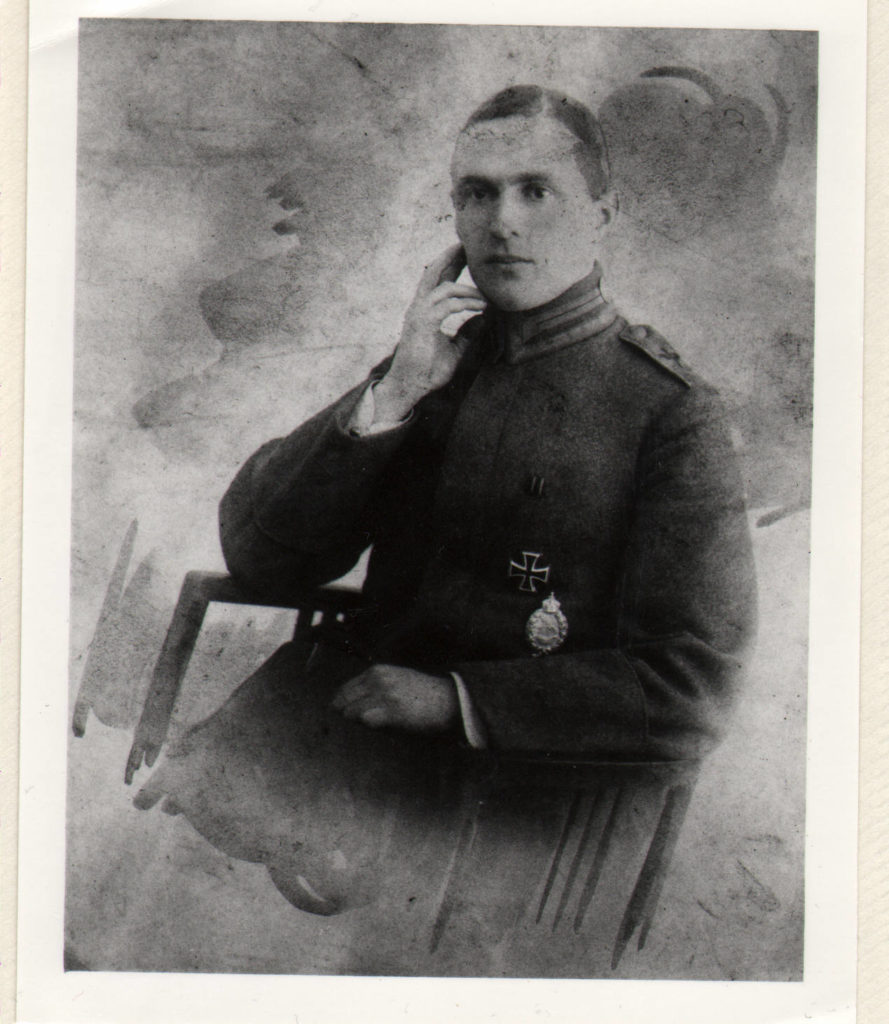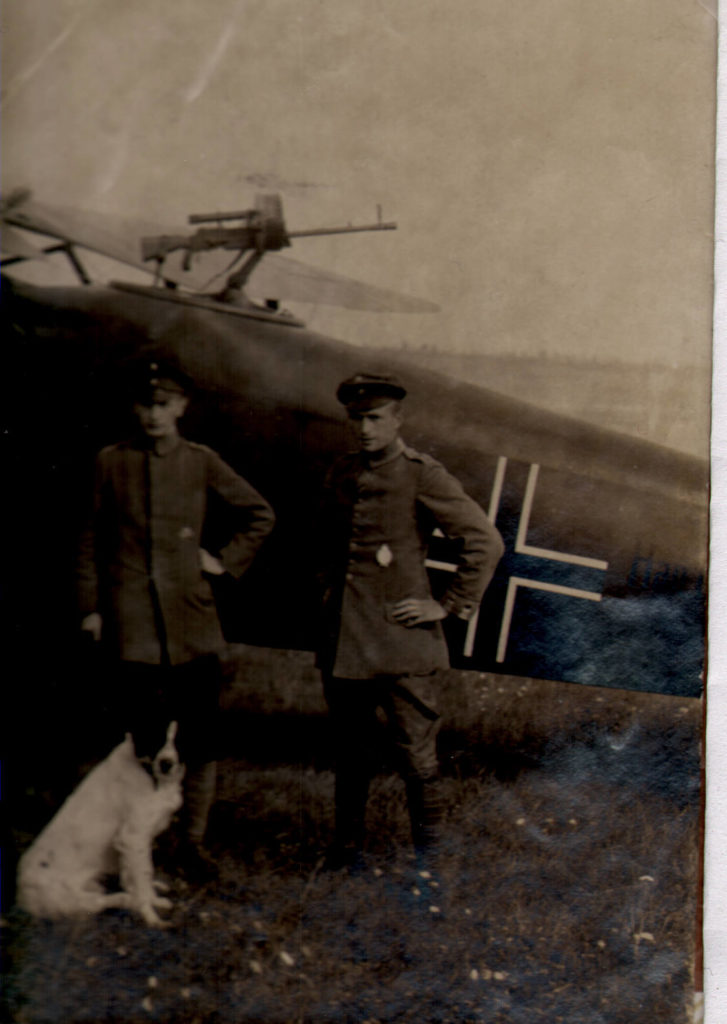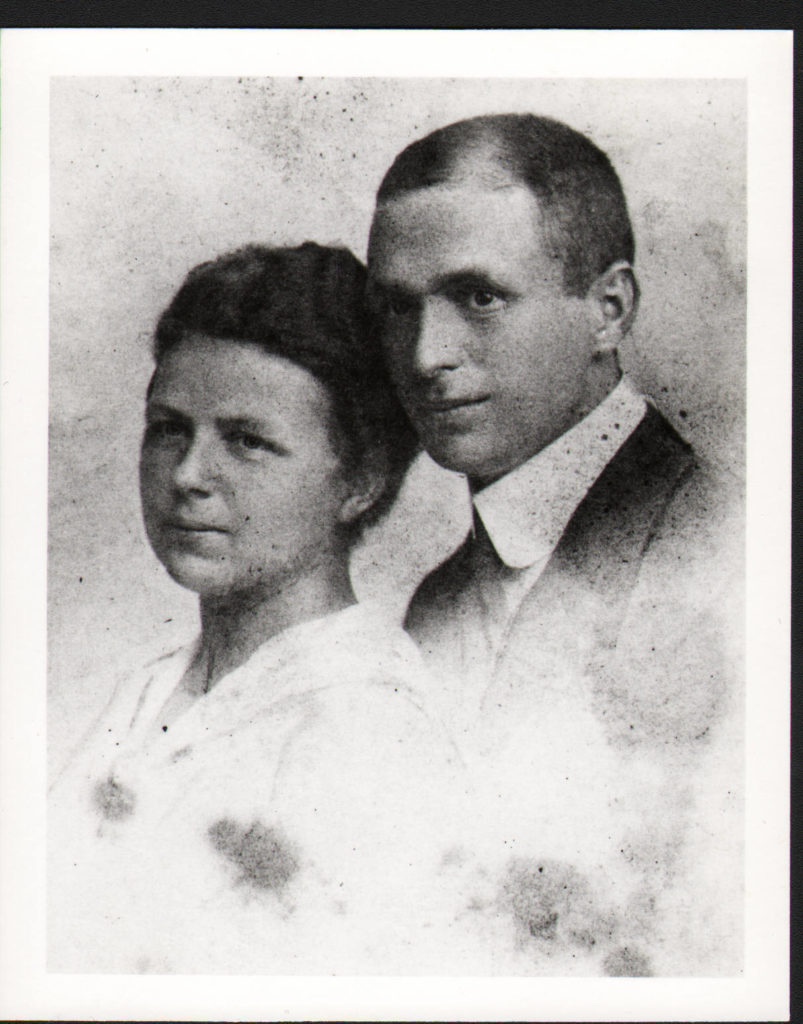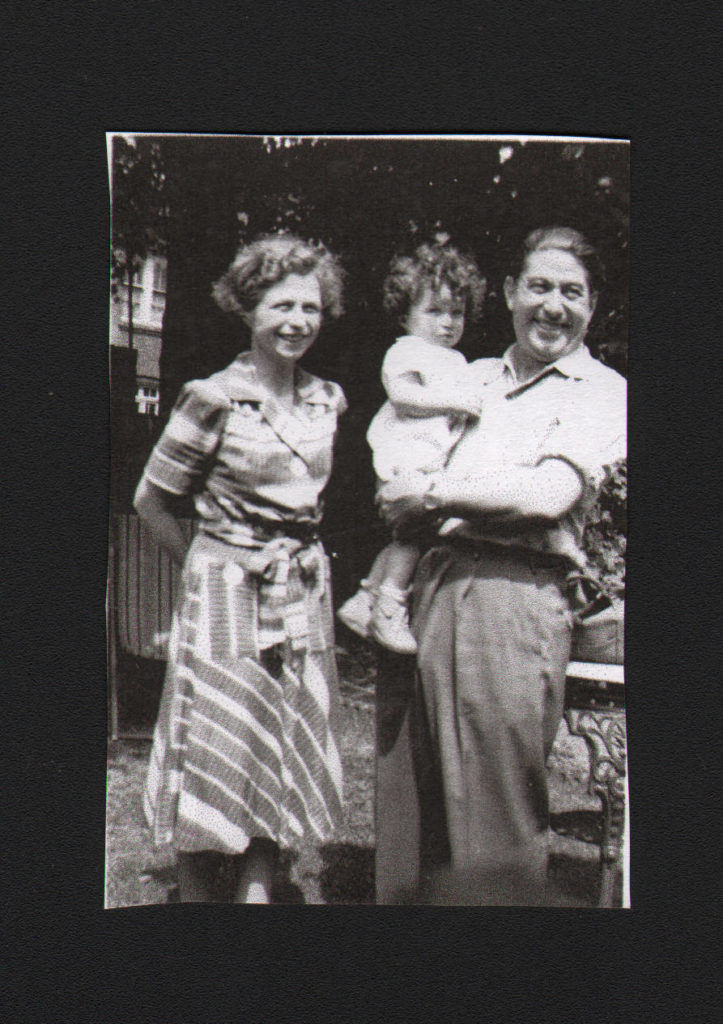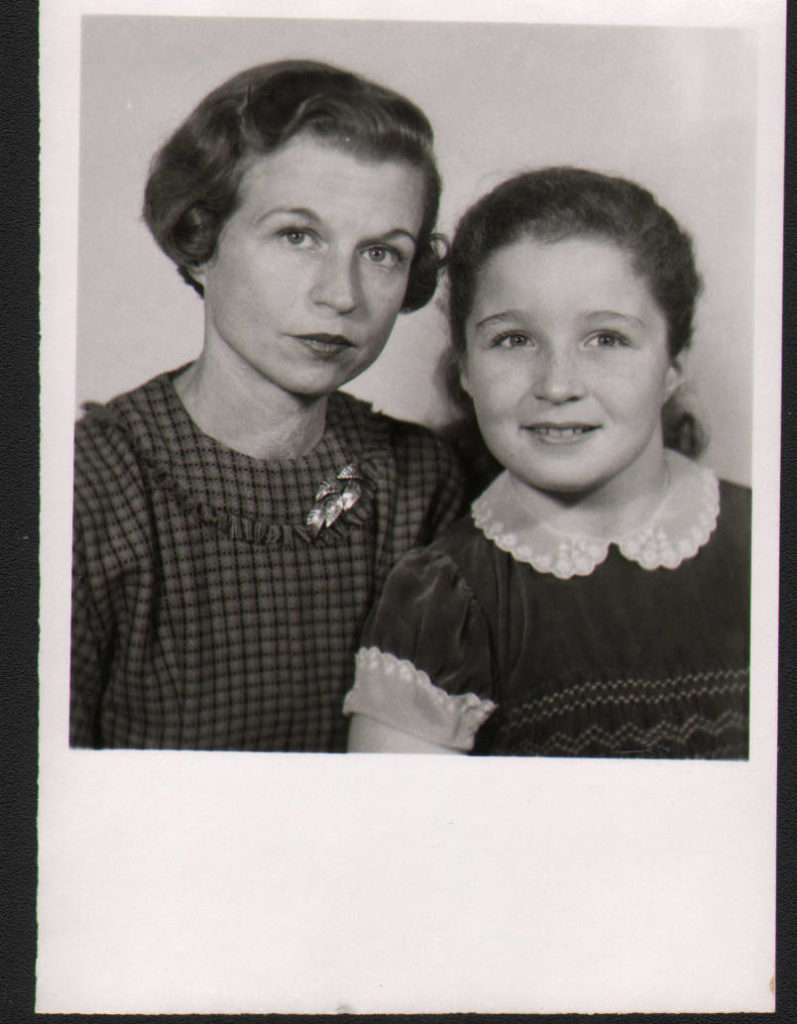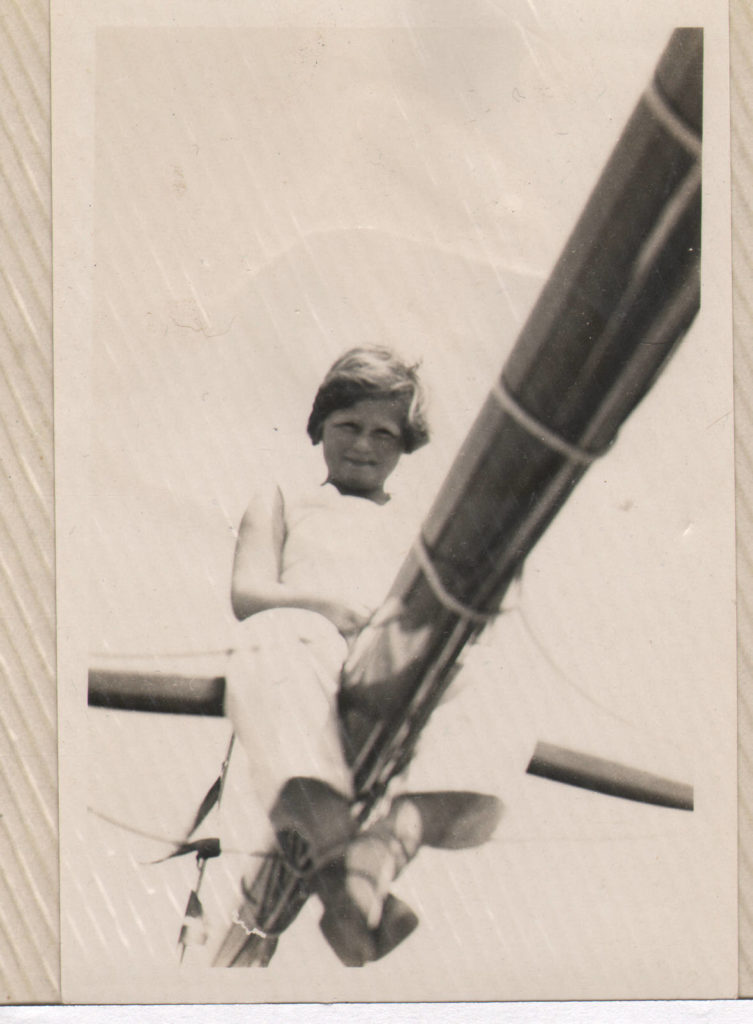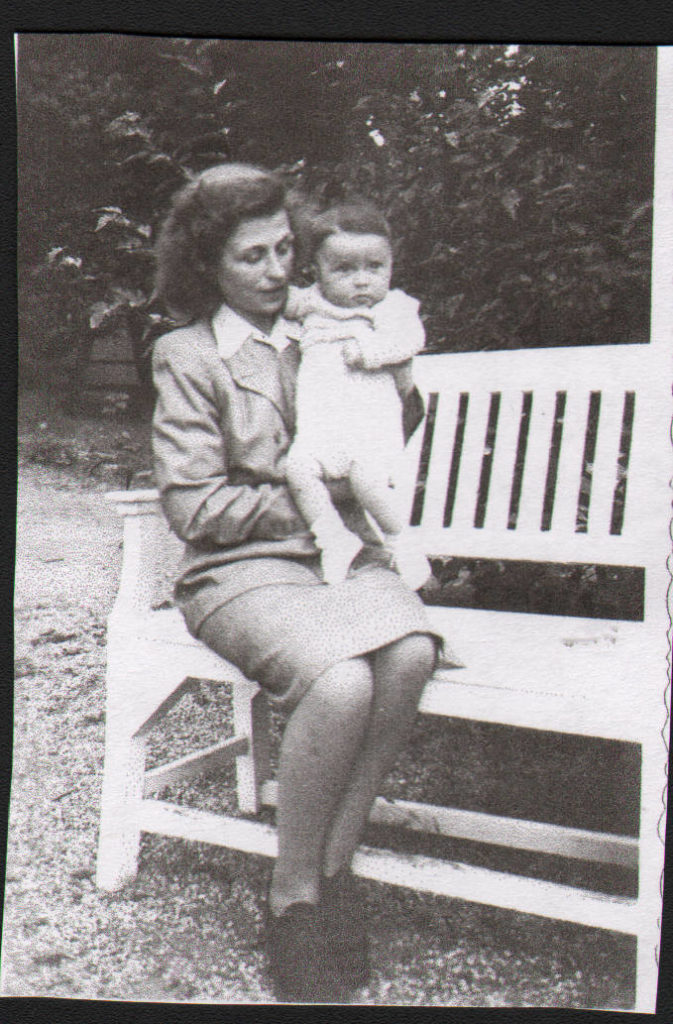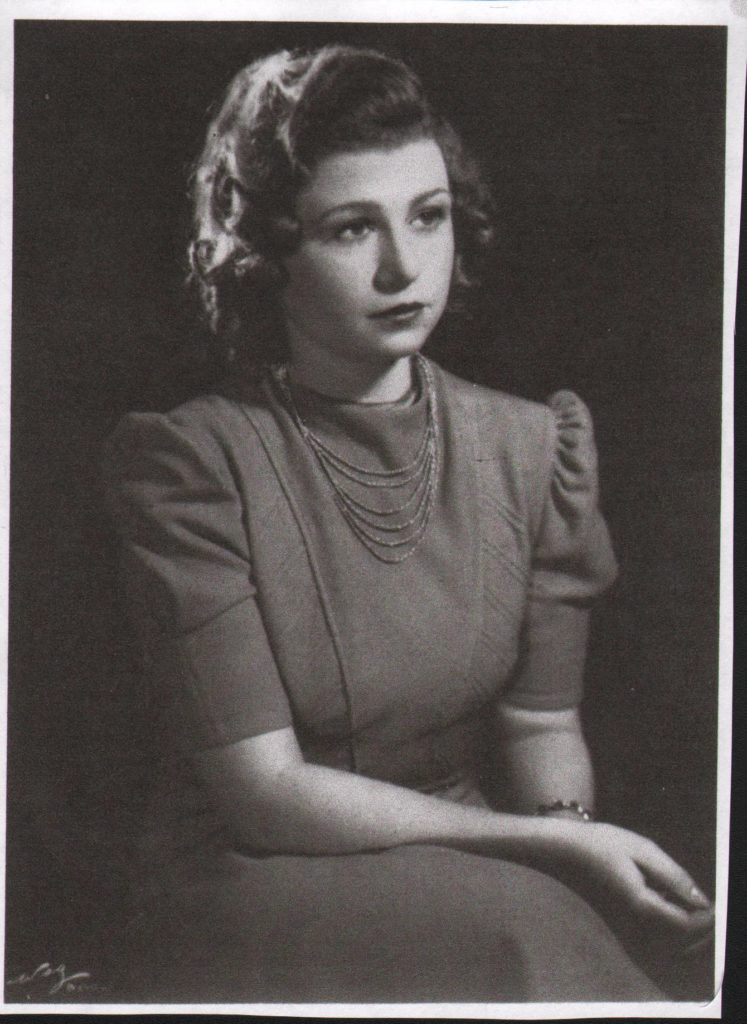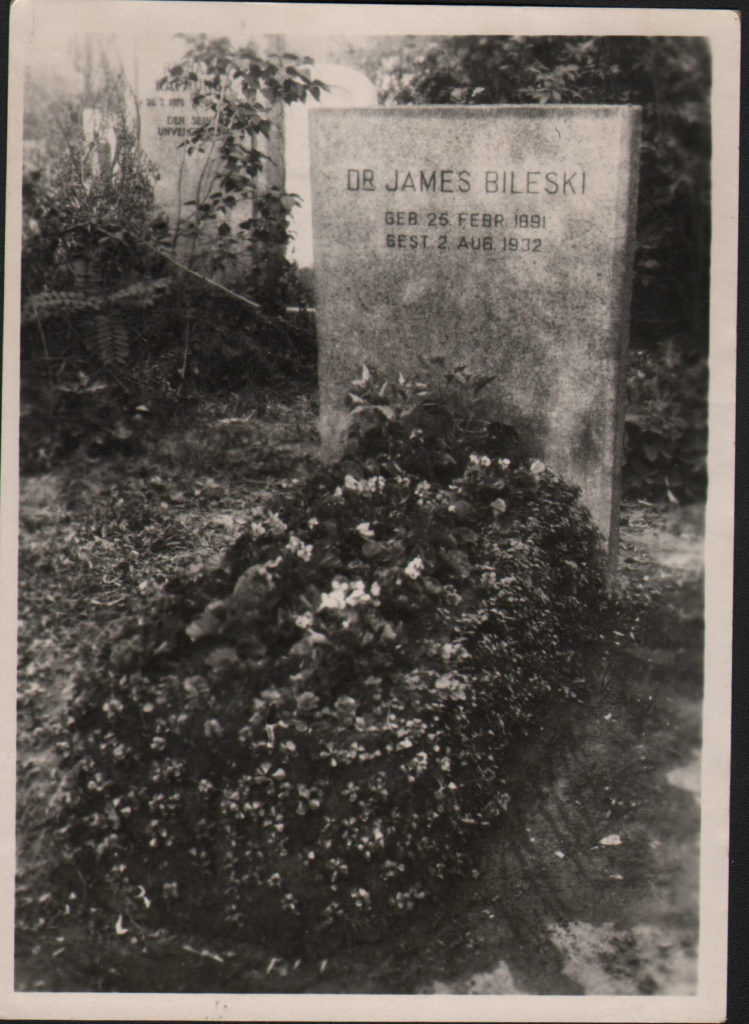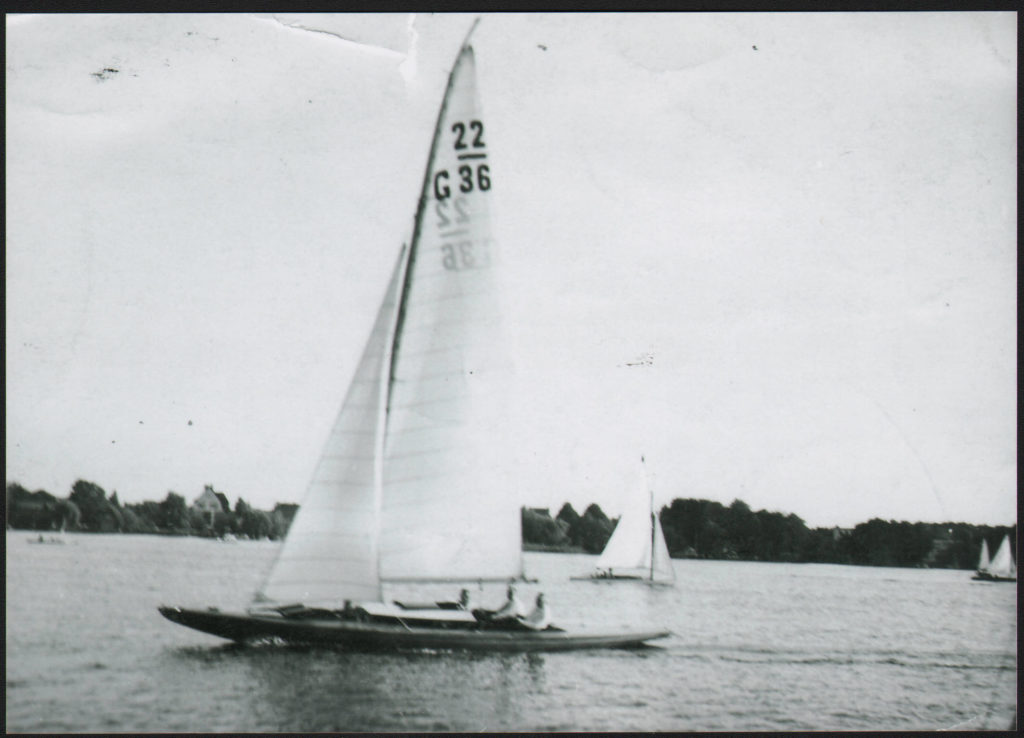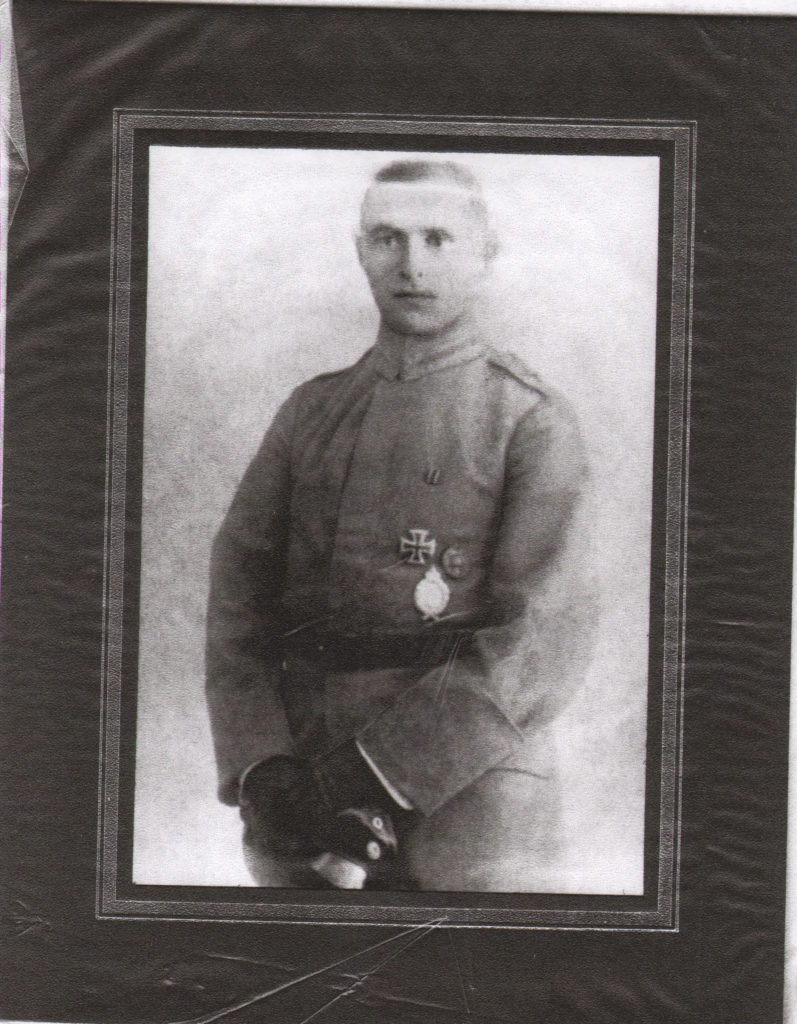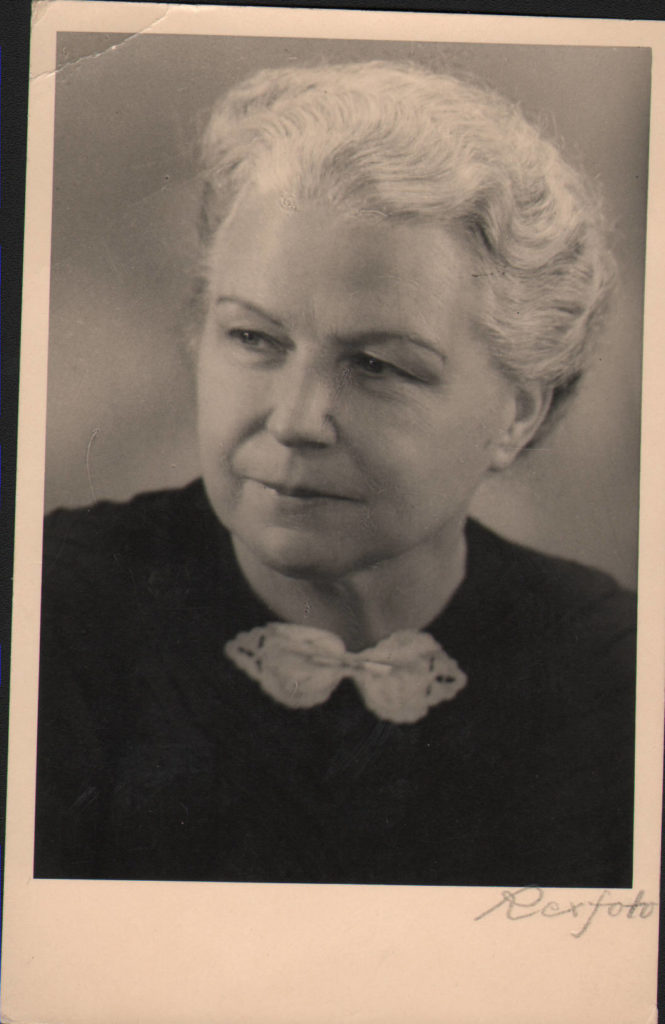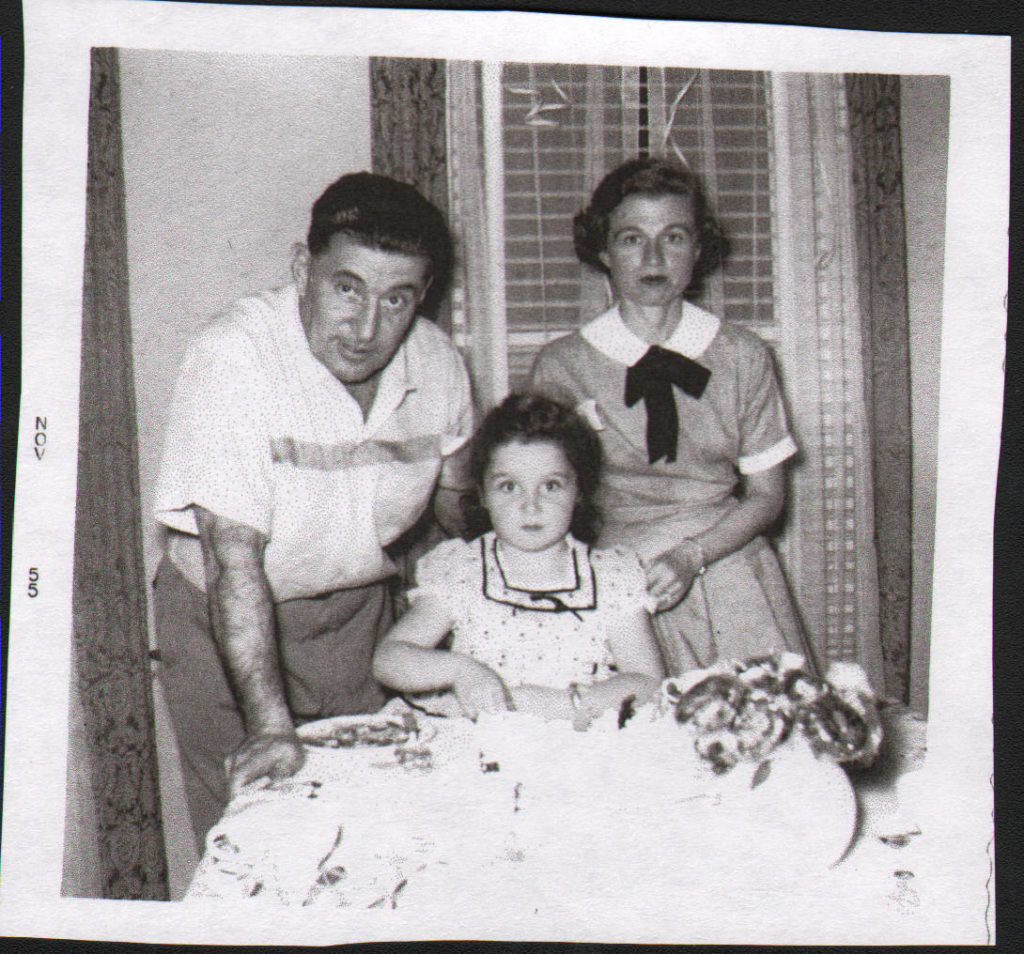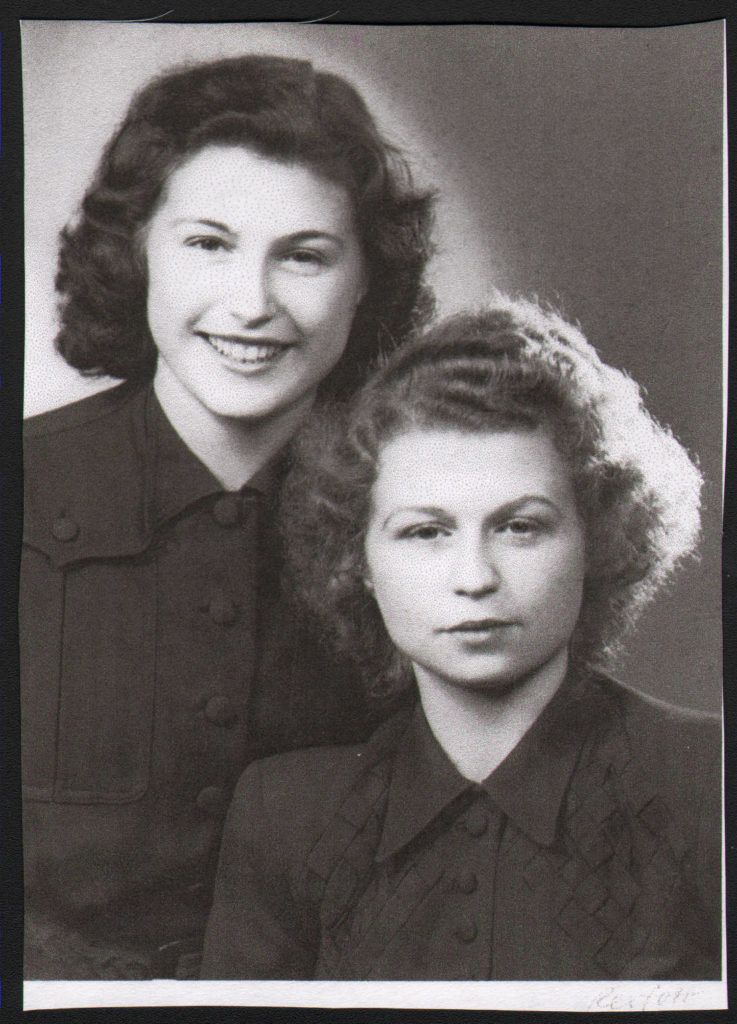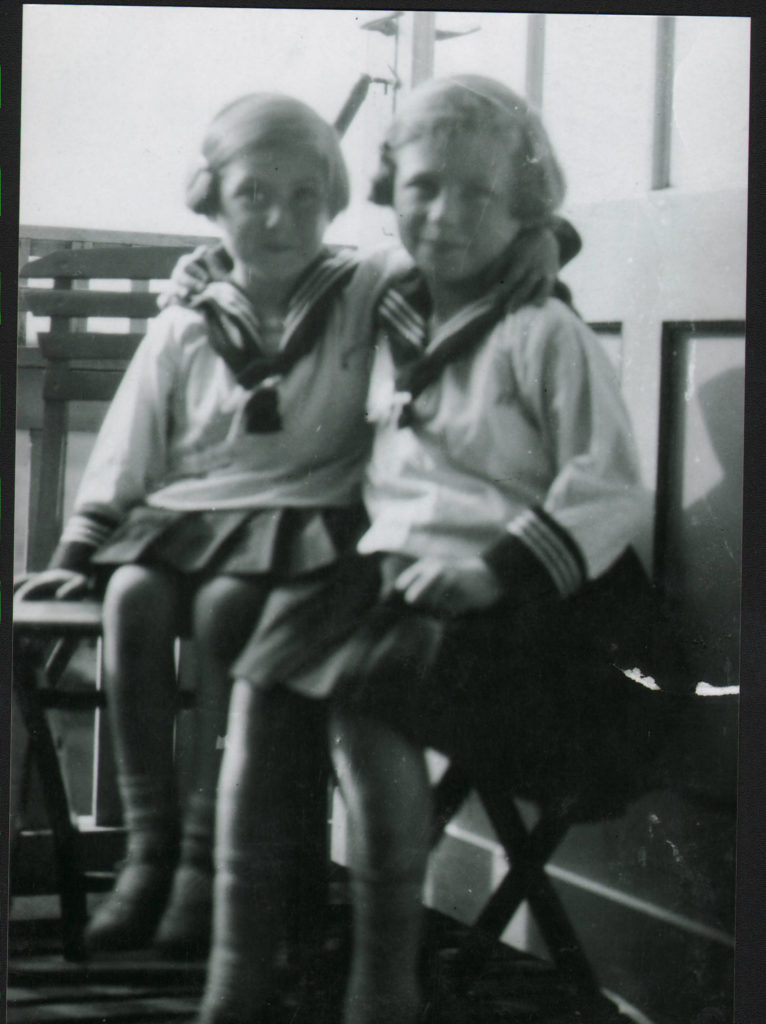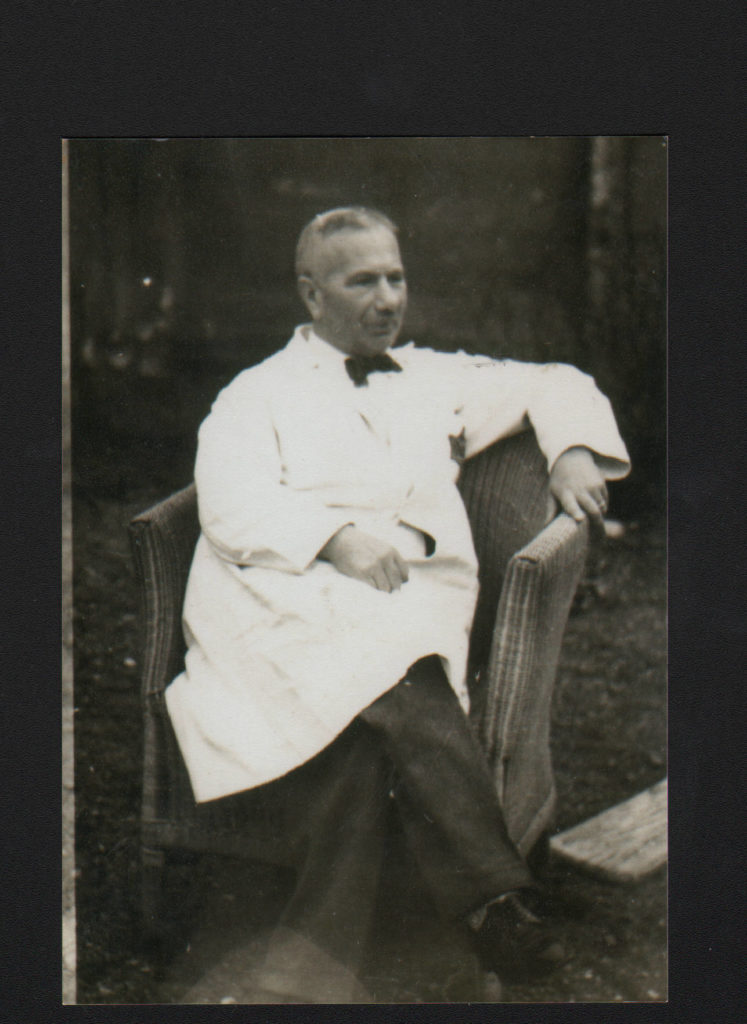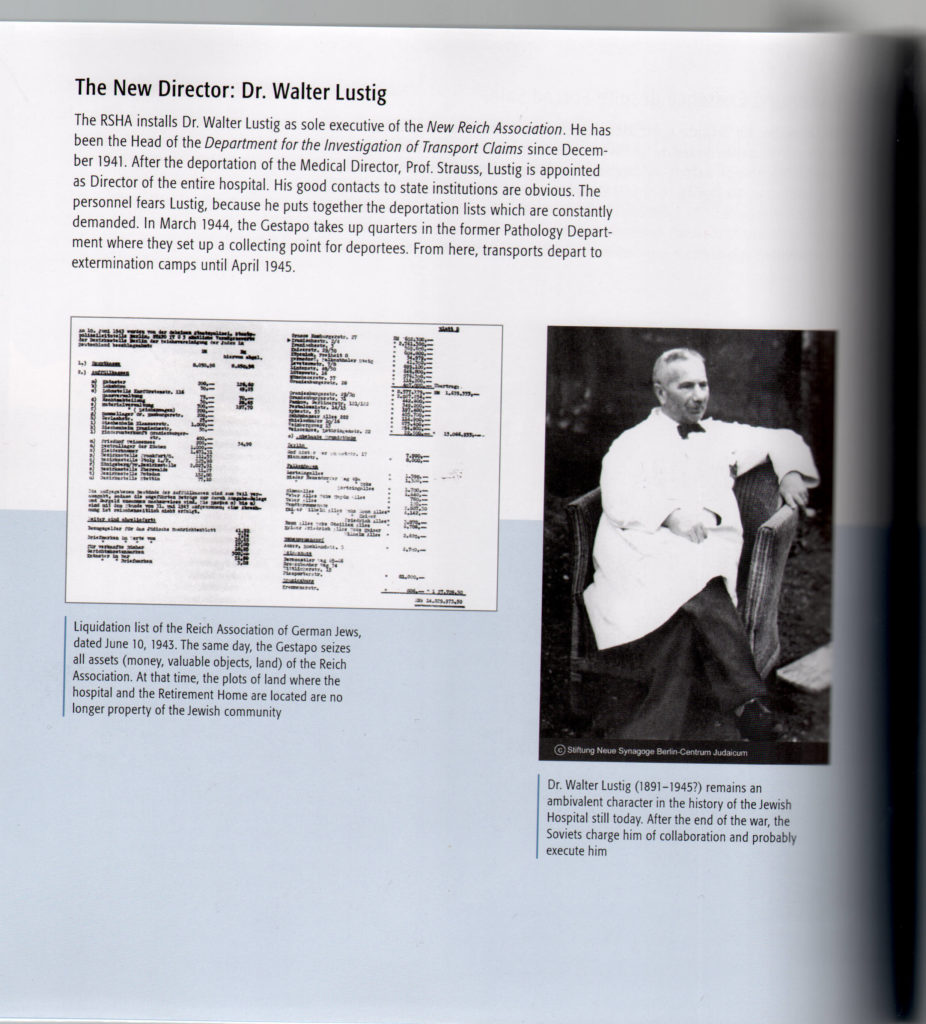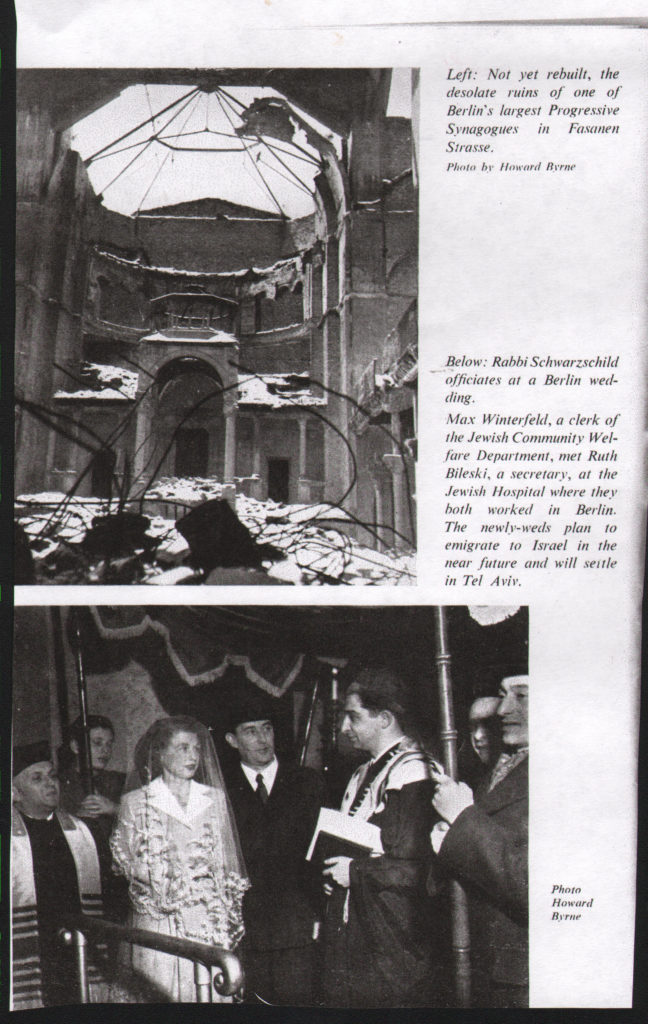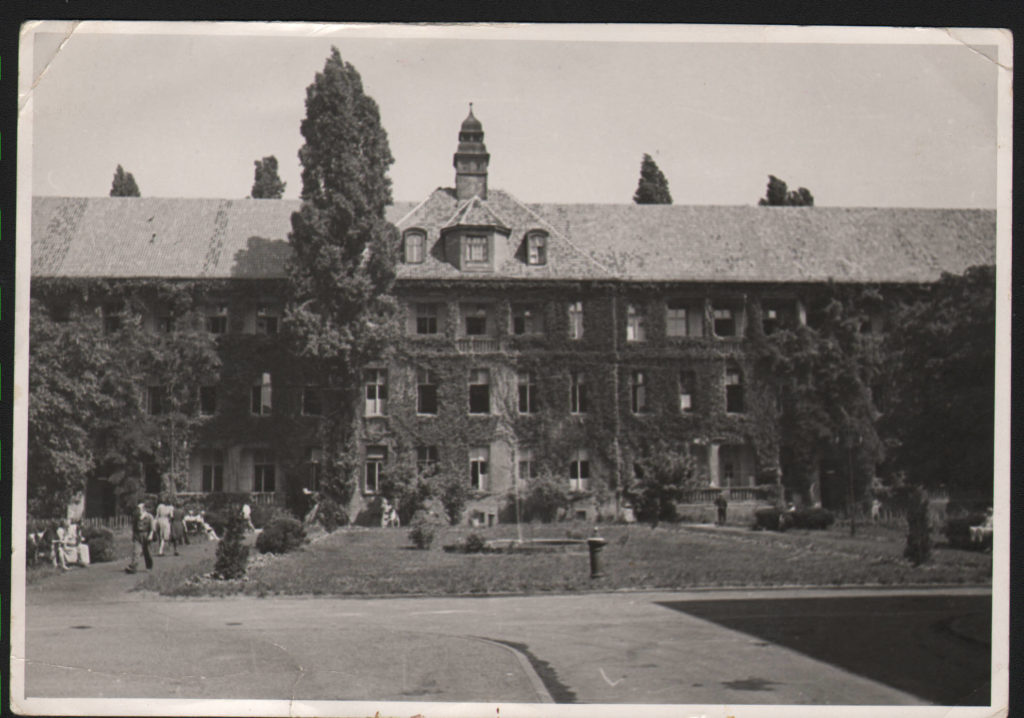Ruth Bileski Winterfeld was born in Berlin, Germany in 1920. Ruth worked as a nurse at the Berlin-Jewish Hospital during the war. She was liberated by the Soviets.
Ruth Bileski Winterfeld
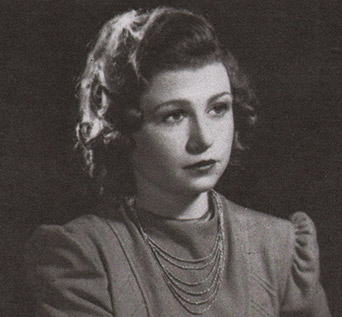
Mapping Ruth's Life
Click on the location markers to learn more about Ruth. Use the timeline below the map or the left and right keys on your keyboard to explore chronologically. In some cases the dates below were estimated based on the oral histories.
Read Ruth's Oral History Transcripts
Read the transcripts by clicking the red plus signs below.
Tape 1 - Side 1
PRINCE: My name is Vida “Sister” Prince and today is July 28, 2011, and I am interviewing Ruth Bileski Winterfeld for the Oral History Project at the Holocaust Museum and Learning Center. So Ruth, we have a lot of things to talk about, but I’d like you to tell me if you possibly can a little bit about your family and you were born, tell me when you were born.
WINTERFELD: I was born on May 28, 1920 in our apartment. It was, you know, right at home and I was named Valeska Ruth Bileski, Valeska was my grandfather’s; grandmother’s name, pardon me. My grandfather was a widower at the time, he lived with us in this apartment. When I was 2 ½ years old, I had a little sister, Eva. I don’t know if she was born probably was born at the apartment because we always had a nurse, you know, schwester Frieda, nurse, ya.
PRINCE: I’m going to stop and check your voice. We were talking about Eva and whether she was born in the apartment or not.
WINTERFELD: Eva was, neidlich, a cute baby. My father was a lawyer by profession. My mother was a housewife. And my father was a soldier in World War I. He had the Iron Cross I, Iron Cross II. He was in fact a hero, he was, (pause) the Red Baron, you know, sent him a letter, of you know, how brave he was a whatever you know, letter, a very nice letter. This letter……..
PRINCE: What did you say? You know, What was it?
WINTERFELD: Manfred Von Richthofen, you know, he was a big shot.
PRINCE: Yes, Yes, but you said something else that which I didn’t understand, I guess maybe, but go ahead, that’s alright.
WINTERFELD: This letter my mother had, and she showed it to somebody because she thought she get some better treatment for us later, you know, when the Nazis, well they well they took the letter and she never saw it again.
PRINCE: Oh how sad. So I think you said he was an observer. Your father……..
WINTERFELD: Yes, yes he was. And we had all these pictures he took. Reims was heavily bombed you know. I remember the albums at home, of course, we walked out of our apartment just like that, nothing.
PRINCE: When the Russians came and the war was over?
WINTERFELD: I never went back.
PRINCE: When the Russians came and the war was over?
WINTERFELD: Yes, this was the worst week, day, night, of my life when the Russians came. I don’t want to talk about it.
PRINCE: We don’t have to talk about it. You, you don’t have……..
WINTERFELD: But that’s a disappointment because we were looking forward to it, to happen, and the way it happened. OK.
PRINCE: OK, So you, your mother was not Jewish?
WINTERFELD: Right, she converted.
PRINCE: When they got married she converted?
WINTERFELD: Mmmm, hmmm.
PRINCE: Then, then how did that impact? I mean, were you still called a Mischlinge? Because she had converted, did that even matter to the Germans?
WINTERFELD: There was a difference. I was a Geltungsjude Juden because I was raised in the Jewish faith. If I had been raised in the Christian faith, I would’ve had a pretty good life. You know compared to this (little laughter) it made a big difference, I wouldn’t have to wear the star, and you had different allowances and food during the war, and so it made a big difference.
PRINCE: Yes, yes it did. Did it make a difference, how did you learn that, that there was a difference for you? In other words, how did you know that you were a Mischlinge when you were young? Because if you were raised in the Jewish religion, and your mother had converted, when did it begin to make a difference that your mother had not been Jewish all of her life? Had not been born a Jew?
WINTERFELD: Well, there was still a difference between a Mischling and a Geltunsjude, you know, with two Jewish parents and one that wasn’t Jewish. They called it Halftjuden, half Jewish, you know, or Geltungsjude whatever. So when we, on that day in February ’43, when we were all gathered up and then during the following week, we came to Rosentrasse. To Rosenstrasse came the people who had a non-Jewish father or mother.
PRINCE: MMM hmm, but your mother, her conversion to Judaism didn’t matter?
WINTERFELD: No, as long her blood was (little laughter) was……..
PRINCE: So it worked for you?
WINTERFELD: Yes it did. It saved my life.
PRINCE: It saved your life being that your mother, even though she became Jewish, converted, it didn’t, that didn’t……..
WINTERFELD: You know my mother was so, that was in the very beginning, when we, the very beginning, well it was actually before my father died in August ’32 and Hitler came in ’33. Well I had, before Hitler, the Catholic people had a Catholic priest giving them religious training. The Protestants and the Jews had someone coming in, I don’t know if it was a Rabbi, but he was……..
PRINCE: A teacher.
WINTERFELD: Then we had a lady, and I didn’t like that lady (lowers her tone) Promya, Promya, I didn’t like her. I couldn’t tell you why really, and I said, oh, she taught us Hebrew too. And I said to my mother I don’t want to go to Hebrew lessons anymore. But my mother insisted that I go. (little laughter)
PRINCE: You were telling me that your father was lucky that he……..
WINTERFELD: that he died.
PRINCE: in ’32.
WINTERFELD: We didn’t realize it at the time, but he was a lucky man.
PRINCE: What did he die of?
WINTERFELD: Well, actually he died from something that happened to him in World War I. That was the first time that the Germans used poisonous gas against the French at that time; and the wind changed and the wind blew back into their own lines, this poisonous gas. And over the years he always had bronchitis and suffered over the years. He finally died from it and that was even acknowledged by the Germans. And the very strange part is that my mother got, you know he was kind of a victim of the war, you know, and people got their pension. And my mother got that even during the war.
PRINCE: She got the pension?
WINTERFELD: That, that pay for a Jewish soldier. (little laughter) If you tell people, but nobody believes it. But that’s what happened.
PRINCE: Everything does seem to be a bit unbelievable because their, the Nazi’s rules……..
WINTERFELD: Right.
PRINCE: and their, and the way they kept them was beyond……..
WINTERFELD: Right, the rule was, you know, if you died from a wound inflicted during the war, then you are entitled to it, ok.
PRINCE: But they probably would’ve deported him. (little laughter)
WINTERFELD: Yes, yes.
PRINCE: If he had not been, you know. Umm, what can you tell me about the people around you when all of these things were happening. Were your friends Jewish or non-Jewish?
WINTERFELD: I had Jewish friends. I had non-Jewish friends. My father was very much into sports. And one of his main hobbies was sailing. And we had, this is another story, we had a racing yacht.
PRINCE: Yeah.
WINTERFELD: And my father would love to sail regattas. And so we had a lot of non-Jewish friends, I guess. In fact my father was very popular. He was a very out-going man. And the club had a, I don’t know what the title would be, the one who took charge, and then the one to……..
PRINCE: Commander.
WINTERFELD: replace him if necessary, and my father was the second. And then the top one had to go for someplace or died or whatever, and wanted to take my father. My father was a very good-looking man on top of it. And he said no, I don’t take that because I’m Jewish, and when I do something wrong, it will be not the fault of Bileski, it will be the Juden you know. So my father didn’t take it. But for his funeral all the people came to his funeral there because he was so well liked, you know. He was buried in August. But, and my mother, we had to room there, where we stayed one night, for the weekend when we sailed. And my mother could keep that for awhile, but they finally didn’t tolerate us anymore.
PRINCE: Mmm hmm.
WINTERFELD: And I have never heard from any people there, but the funny thing is, this boat, and my father had it built, it was a Swedish racing yacht. It was beautiful. And my mother had to sell it. And she happened to see just how they put it on a big ship. It was sold to the Bodensee, by the Swiss border down there. Well, she saw how it went and it was very, very hard for her.
PRINCE: Oh I’m sure.
WINTERFELD: The boat was named Pusteback.
PRINCE: What is it?
WINTERFELD: Pusteback, that means, you know, you blow wind (she blows air from her lips) my uncle, my mother’s brother had found that name. But anyway the boat was gone. And after the war, I tried to get in touch with the club again. The club is on an island in the lake outside Berlin. And I got in touch with people there, and I got in touch with some clubs in the West. And everybody remembers that boat.
PRINCE: Oh they did.
WINTERFELD: And I did find out where the boat actually is on the Bodensee and, you know, last year I sailed on the boat.
PRINCE: Oh no.
WINTERFELD: It is an unbelievable story. The people who have it now are so nice and so good. They take so good care of the boat. In fact, he had to replace a part on the boat and he saved that part and had it mounted and engraved and gave it to me as a gift.
PRINCE: Mmm hmm, so……..
WINTERFELD: And I have pictures of it. Do you want to?
PRINCE: Is it a sailboat? Is that what it was?
WINTERFELD: It’s a sailboat. It’s very. It’s a Swedish boat. Very slender, you know, because in Sweden they have the sheer rocks in front of the coast where you have to go in between……..
PRINCE: It must’ve been so well made to to……..
WINTERFELD: You know I can’t describe my feeling. I went down on my knees and I touched this boat.
PRINCE: Sure, sure……..
WINTERFELD: And he let me steer it. (little laughter)
PRINCE: Your father must’ve been a very interesting man.
WINTERFELD: He was. He was on the Olympic committee 1928 I guess that was in Amsterdam someplace. He was very much a sportsman. He skied in winter and went skiing and to Italy and to Austria. Wherever snow was we went skiing.
PRINCE: So you were used to a very interesting and well……..
WINTERFIELD: Yes.
PRINCE: well accomplished people, and so I can see that you would have many non-Jewish friends. Where did you go to school?
WINTERFELD: The school was right by where I used to live. The street, all that doesn’t exist anymore in Berlin. That all was bombed out, you know.
PRINCE: Was it like a private school? That’s what made……..
WINTERFELD: No it wasn’t. In fact I remember one incident when the Nazis came to power, and we were not used to that yet. And somebody scribbled we had –certain, told us where we had to do work during the lesson – others were done at home. But anyway, somebody scribbled something anti-semetic on, and I went to the teacher and apologized for that. You know that is, and he almost threw this at me. You don’t know what’s going on now. You know, after was die glocke aeschlagen hat. (What the clock tolled.) You know, now we are in power, you know.
PRINCE: How frightening.
WINTERFELD: Yeah, it was. But he was still my teacher for awhile. And after the war he was the first one who came to the Jewish hospital there. How he found out that I was there. He wanted to say for him that he was a good man, you know, he. I showed him the door.
PRINCE: You showed him the door.
WINTERFELD: Yeah.
PRINCE: And how did you do that? Did you say something to him?
WINTERFELD: No, I didn’t say much. I was speechless. (little laughter) That he had the guts to come to me.
PRINCE: He was doing it for himself.
WINTERFELD: Yeah, I showed him the door.
PRINCE: Mmmm.
WINTERFELD: That was actually the only one I had a bad experience with at the school there.
PRINCE: Mmmmm. How about the students? How about your……..
WINTERFELD: Ya, there were some Nazis, there were a lot of Jewish girls, it was a neighborhood then.
PRINCE: Just a neighborhood school.
WINTERFELD: Yeah, I knew one she did not come back from vacation from the week vacation in summer. She stayed in England, and actually my best friend was a Jewish girl. She lived across the street in an apartment. But I had non-Jewish friends too. And uh – but when the star came, you know, it all ended because they, didn’t want, couldn’t be seen with somebody running around……..
PRINCE: With a star, yeah.
WINTERFELD: Yeah, it was dangerous for them too.
PRINCE: And how did that make you feel to wear a star? How did it make you feel when you had to wear a star?
WINTERFELD: Not very good. You know at first came the star and then later on you had it at your door too where you lived.
PRINCE: How, how, on what part?
WINTERFELD: On the apartment door, the entrance to your apartment.
PRINCE: I did not know that.
WINTERFELD: You had to have a star too.
PRINCE: Where you would walk into your house or your apartment?
WINTERFELD: Yeah.
PRINCE: On that door. What was it made out of?
WINTERFELD: It was just – just black & white paper. That you had to ……..
PRINCE: Oh.
WINTERFELD: And I remember when the Russians came, of course, we were all in the basement, you know. But our apartment had the star still on there, and when they came we tried to tell them that we were Jewish. Which Jews? Jews kaputt. Jews kaputt. No Jews. They didn’t believe that we were Jews.
PRINCE: Well, I can’t, I want to go to where uh, the change came. Hitler was – your father died in ’32 and Hitler came into office in ’33, and so you were like 13.
WINTERFELD: I was 13 in ’33. I was born in ’20 and you see my – after my father died his brother was a lawyer too. He was a Zionist. He went to Palestine in the 20’s with his family. He had a wife and two boys to stay. He was a friend of Chaim Weizmann’s. He was an early……..
PRINCE: Zionist.
WINTERFELD: But he had to come back because he caught malaria so badly. So he came back to Berlin. It was – there was nothing going on at the time when he came back. And when he went in 34, he said malaria is better than Hitler. You know, so, he left again with his family.
PRINCE: That was very smart of him.
WINTERFELD: And he even asked my mother; my father was dead already; and he asked my mother if she wanted to come. But my mother thought it wouldn’t be fair for him to care for two families. And she didn’t, she didn’t take that offer.
PRINCE: Mmmm. Was there any other family that you had that was close to you?
WINTERFELD: My mother’s sister was very close to us. She was non-Jewish, she was very, she came every Saturday to us, stayed overnight til Sunday. She was – and after the war she was an angel, and she had a brother. He was very good too.
PRINCE: So when you were working at the hospital was she available to you at that time?
WINTERFELD: Well, and she stayed in the apartment, yes she – I was hospitalized at times and she could come and visit me. And in fact……..
PRINCE: Was she friendly? Was she helpful at those times when the war was going on? Your, your……..
WINTERFELD: My mother?
PRINCE: No, not your mother; your aunt.
WINTERFELD: Oh yeah, she was, she was an angel. Yeah. But my mother, you know, after the first night, after the Russians came, I said I cannot stay here another night. We went not even back to the apartment. We were not washed. We walked, and walked, and walked to the Jewish hospital which was on the other end of Berlin. It was a long walk. My mother, my sister, and there was a friend of my sister’s, she came with us. And we walked and came to a neighborhood, and suddenly there came two Russian soldiers – Oy Vey!
PRINCE: (small laughter)
WINTERFELD: Well, it happened to be a Jewish soldier. And he didn’t believe that we were Jewish. I had to say the Shema, and he believed us. And then he pulled a silver knife out of his boot. He probably had it stolen some place and he came with a big box of jam, and he wanted to feed us jam because he wanted to do something good to us. (little laughter)
PRINCE: Something nice for you.
WINTERFELD: (little laughter) But what he did, he gave us a little slip in Russian, and I folded it in and wore it on my breasts here to say that they let us pass for the Russians, you know.
PRINCE: Yes, yes.
WINTERFELD: Ok, and we went on walking and came to a part that was so German, Nazis. And he pointed at me and said “sofort verhaften.” (immediately arrest) You know, take her in she’s a traitor. And I had this slip here, but it was a mistake, he didn’t mean me. But it was a mistake but if they had found that Russian slip……..
PRINCE: That Russian
WINTERFELD: I would’ve been (laughter) so I was safe once more.
PRINCE: You had so much luck.
WINTERFELD: (Laughter) Ya, for it to happen. Take her, take her right away. But we walked again, and walked again, and then we came to the corner by the hospital. The hospital was, there was nobody. Neither Germans, nor Russians, nothing you know. And this part was still, there were no Russians yet. And I said, I have to get over to the hospital. And this soldier said, you know at night we take the wounded over to the hospital and I let you come with us at the time. Ok, but then I said there was my sister, and my mother, and this girl still. And I said, I can’t wait that long. I can’t wait that long. So we crossed and there was a street car sitting there. And behind the streetcar the Russians were shooting at us and from this side the Germans were shooting at us.
PRINCE: Oh!
WINTERFELD: We were running, you know, we were running towards the hospital.
PRINCE: Oh dear!
WINTERFELD: Somehow we made it. We lived. We came and everybody was under ground in the hospital, you know, in the cellar.
PRINCE: Yeah. Because of the Russians?
WINTERFELD: Right, and the bombs, you know.
PRINCE: The bombs.
WINTERFELD: The bombs. And the patients, whatever was left of patients, right down there –it was a big mess, you know. But we survived.
PRINCE: You survived. What kind of – I mean we’ve talked and talked and the fear, or the terror – did it ever go away?
WINTERFELD: The fear?
PRINCE: Yes, I mean there was so much to be afraid of. There was so much, I mean here you were walking and you’ve got to worry about the Russians and you’ve got to worry about the Germans. And – weren’t you frightened, and terrorized?
WINTERFELD: Yes, yes, yes.
PRINCE: But was it a continual thing that you were – or was it just a state of mind?
WINTERFELD: Well, I guess you get used to it (little laughter) somehow. It, it, of course, we were afraid all the time because……..
PRINCE: Yes.
WINTERFELD: any time a Gestapo man could show up and take you in and that was always possible.
PRINCE: Right, yes
WINTERFELD: You know, we tried, we still lived in this apartment and had to travel. You needed a special license and exception, which we got, we had to travel on the train with all the other people. And we would use a purse, you know, to cover the……..
PRINCE: To cover the star.
WINTERFELD: And so nobody knew and nobody cared. It was such a mix up anyway, you know. There were alarms during the night, and bombs were falling, and houses were destroyed. So they didn’t care much.
PRINCE: Anymore.
WINTERFELD: You could travel. Well the trains were crowded. You were close together.
PRINCE: Mmmm hmmm.
WINTERFELD: They didn’t even see where you were, what you were (little laughter) you know.
PRINCE: The big question is, you know, that, how all of this was allowed to be OK. This Jewish hospital, this cemetery, this – because, I mean, in other countries they were smashing – in other parts of Germany, they were smashing all the Jewish cemeteries and using the monuments for sidewalks and killing everybody. I mean, and here was this oasis, this island that was allowed to be. Um, can you give me any?
WINTERFELD: Well, first of all I think the Gestapo used it so they didn’t have to go to the Russian front, you know. They played with the Jews there, you know.
PRINCE: Mmm hmmm
WINTERFELD: Used that as a very important task to do, and they didn’t have to be out to be shot by the Russians. (little laughter)
PRINCE: Ok, so they used – they used it?
WINTERFELD: They used it. And I don’t know what Dr. Lustig was before Hitler. He had a high position and worked with these people who were in charge, now they were his colleagues……..
PRINCE: Right.
WINTERFELD: at one time. And they knew him from that time. And I don’t know how much influence that had because when they came, when they left Rosentrasse this man in charge there, he called Lustig and said, of me, I have a secretary for you. That’s, and I typed for 36 hours in a row.
PRINCE: Ohhh.
WINTERFELD: At Rosenstrasse, and I guess that impressed this man, you know.
PRINCE: Oh.
WINTERFELD: Because (little laughter) I just collapsed after this. I don’t know how I did it. I don’t think I could do it again.
PRINCE: No. And what were you typing?
WINTERFELD: The list of the people who were……..
PRINCE: Deported.
WINTERFELD: (sigh)
PRINCE: So that was a samallager. You were saying?
WINTERFELD: After, after I collect that, a policeman, a regular policeman not SS, tapped me on the shoulder and said, I wouldn’t go to sleep here. And he gave me a bar of soap so that I could wash my hands.
PRINCE: Mmmmm. So he saved your life right? Yes. Were you fed there? What was the food like?
WINTERFELD: Well the food, I guess it was delivered by the hospital, you know. There was no kitchen. And I remember the first day, there were 300 women in a room about the size of this one.
PRINCE: There were 300 women.
WINTERFELD: We were picked up at the factory
Tape 1 - Side 2
PRINCE: Ok, you were picked up at the factory
WINTERFELD: Yeah, in trucks.
PRINCE: It wasn’t like a raid? They were……..
WINTERFELD: Well there were, – in order to get to that factory there was a wall. You had to go through the wall. There was a special entrance for the Jewish. And……..
PRINCE: For the Jewish workers to come in?
WINTERFELD: Yeah, and then there were the SS that picked you up and put you on that truck right away. You couldn’t even go into the building anymore.
PRINCE: But wasn’t there a raid on all the factories?
WINTERFELD: Yeah.
PRINCE: In Berlin at that time?
WINTERFELD: Yeah, friends of my aunt, she worked……..
PRINCE: To pick up all the Jews?
WINTERFELD: She was not Jewish, you know. She was, she was not, but she came that Saturday, she knew that at her factory was raided, but they were all picked up. So when we had the afternoon shift at that day, we knew what we were running into.
PRINCE: Mmmm hmmm.
WINTERFELD: When we went there. But you see that we didn’t have any choice, they would get us one way or another. And they did. They came to us – came to our apartment and asked my mother for her children. And my mother said, I want to know from YOU where my children are?
PRINCE: Your mother was very brave.
WINTERFELD: Well, I think she was desperate.
PRINCE: So they picked you up and put you in there, and then?
WINTERFELD: And then first we went to – it was a huge stable, stable where we came not prepared for anything like that. So, I remember there was sand on the floor. We stayed there overnight and I even found some people I knew with a baby.
PRINCE: Mmmm.
WINTERFELD: That was, that was terrible. And then they might, next day they sort, helped you, you know, get Jews to this side and the other this side. And then we went to Rosenstrasse.
PRINCE: Ok.
WINTERFELD: And that, you probably in the film they show that, I, myself hadn’t seen the movie. But the, the Aryan parts of marriages, they demonstrated outside and that’s what saved us.
PRINCE: Yes.
WINTERFELD: They gave in to that for some reason.
PRINCE: Well, you know in the book, this “Refuge in Hell” by Daniel Silver, this book; and in the beginning they were saying that one of the reasons that they, uh, I won’t use the word honored, but didn’t take the Aryan and the Jewish spouse away was that they felt the German people would really not have liked that. Because marriage was very sacred to the German people.
WINTERFELD: Ya.
PRINCE: So they honored……..
WINTERFELD: Right.
PRINCE: if you want to say, that’s not maybe not the right word, the um, the spouse……..
WINTERFELD: Yes, that’s true.
PRINCE: the Aryan and the Jewish.
WINTERFELD: And it was not going too well the war at that time already, you know.
PRINCE: Mmmm Hmmm. Well I thought the book was a huge shock because you’re just used to reading and hearing stories of just everybody, you know, (small laughter) being gone, but this hospital. So, so……..
WINTERFELD: Like, I wanted to tell you in Rosenstrasse, we were in a room, 300 women, but not prepared for anything. We had our coat. There was no blankets, nothing on the floor. We stayed there ten days, and then one day, somebody came. Is there somebody here who can type? My sister, mein schwester, (my sister) and they took me, took me outside. It was bitter cold that day, and I stood there and waited, and waited; and I thought there is something not right here. They’ll probably shoot me.
PRINCE: Mmmm.
WINTERFELD: Well they didn’t shoot me, but it took hours and hours. I missed the one meal we got which was sauerkraut. (little laughter) And they didn’t give us even a spoon (little laughter) or anything to eat with. Well anyway, they took me back and I thought next day, I said don’t do that again. But she did again. And this time they took me. You know, and they made me type for thirty-six hours.
PRINCE: Ohhh.
WINTERFELD: (Little laughter)
PRINCE: That was in, that was in……..
WINTERFELD: Rosenstrasse.
PRINCE: Rosenstrasse. Yeah, but, but, now so then they call the hospital and said they……..
WINTERFELD: Then he called and said Lustig, I have a secretary for you. Well, after we stayed, and people were released, you know. My mother came; she didn’t recognize me.
PRINCE: Ohhh.
WINTERFELD: But it was through a window there, maybe, well, and I guess we just didn’t look very good. (little laughter)
PRINCE: Well, you probably were exhausted.
WINTERFELD: But, what was nice we went to our apartment and it was war and hot water you got once a week, you know, so you could take a bath. And there was not, not the time for it, water. But our care-taker there, when my mother told him that we came back, he made heat so we could take a bath.
PRINCE: Ohhhh.
WINTERFELD: That was nice.
PRINCE: Yes, so how did you get to the hospital then?
WINTERFELD : Well, he, he did call Lustig and said I have a secretary. And I said I don’t go anywhere without my sister. So he made my sister go into the hospital too. And was the 9th of March, we had to be at the hospital.
PRINCE: There you are with your star on you? And you are telling who, that you can’t go anywhere without your sister? Who are you telling that to? Not, not an officer, not a Gestapo person? Who are you saying that to? I don’t go anywhere without my sister.
WINTERFELD: Ummm……..
PRINCE: Who, who, who said to you? You’re going now to the hospital. And you said to them I don’t go anywhere……..
WINTERFELD: Oh, oh, oh ya, and he gave a, my sister got a job there too at the hospital.
PRINCE: Right, but I mean, there you are, you’re not a big, big person. You’re a small built, delicate woman; and you had a Jewish star on you and was he a Gestapo?
WINTERFELD: Ya, of course he was (little laughter) Ya (little laughter)
PRINCE: (little laughter) Alright, I just want people to know the story as well as possible.
WINTERFELD: (little laughter) Ya, it’s true.
PRINCE: And so you both went. Alright now, tell me about……..
WINTERFELD: My sister got a – it was after all a hospital, of course you couldn’t go there when you were not Jewish, you know.
PRINCE: Mmmm Hmmm.
WINTERFELD: It was, they had one floor, there was some people, I call them inmate, Dr. (pauses) he was Minister of Justice, and a very old man. He was somehow protected by an artist and had a room at the hospital. And there was one couple, Oppenheimer, they must’ve had a deal with him too. They, they lived there.
PRINCE: Mmmm Hmmm.
WINTERFELD: And there was one, was another old lady who lived there – and then came later a Russian couple. I mean they were Jewish. He was Jewish and she was a – even the wife of somebody who worked there. Anyway they were kind of protected from……..
PRINCE: Mmmm Hmmm.
WINTERFELD: They lived there.
PRINCE: But, did you say. Did I hear you say that only Jewish people lived there – at this hospital?
WINTERFELD: Ya.
PRINCE: Are you talking about before the war – or?
WINTERFELD: Before the war, well, you know the Nazis you wouldn’t go to Jewish hospital.
PRINCE: No, but I mean even before that. Before Hitler came into power?
WINTERFELD: Oh yeah, they had very famous doctors there, working there. Dr. Strauss, they……..
PRINCE: Yes.
WINTERFELD: Yes.
PRINCE: But, but……..
WINTERFELD: It was for the public, ya.
PRINCE: It was for the public then. But not after the war. So you immediately – who did you start typing for: Lustig, or somebody else? When you went to the hospital?
WINTERFELD: Oh, OK. Now, you know, he had said to Lustig: I have a secretary for you. So we got into this office and I met his secretary. I felt terrible. I felt awful. But the good thing, she did not go. She did not go; he kept her. I was working there in the office, but not directly for Lustig, it was somebody out there. So she kept her, and she even had her old mother living with her in one room in the hospital; and they both made it through the war.
PRINCE: So, he worked, Lustig – am I saying it correctly? He was in charge of the hospital. But he also had to do the Gestapo bidding. They told him what to do.
WINTERFELD: Ya, and I had no idea, you know, there were transports going from the hospital maybe every two weeks or so. Every time two nurses and a doctor had to with it. And who picked these people, (sigh) I don’t know.
PRINCE: For the sake of the tape, Ruth is talking about deportations to concentration camps or death camps.
WINTERFELD: Sometimes they say they would go to Theresienstadt which was a preferred camp and some people survived it there. Ya, that was the way it worked. And she, and his office was across from the place where I worked. And there was an anteroom, you know where the secretaries sat, and then there was his office. This was, secret, and I never went into this room. I don’t know if there was another exit. When the Gestapo came, they were in that room. And I don’t know – there was a window or no window, I don’t know what was going on in this room. But apparently very important decisions were made there. And I don’t know how much his influence – how much influence he had on – but he must have had some.
PRINCE: As you were saying earlier, yes, he was head of the Gemeinde. I don’t know how to say it, it’s a German word. But he was head of a lot of Jewish agencies that made decisions for all these Jewish people. Even before – so, as you say, he worked with the Germans……..
WINTERFELD: Ya, but that was, that was a, you know a police job, you know. It was not an anti-semitic type of……..
PRINCE: Yes.
WINTERFELD: General, for the general public. And he must have had some, some influence on them.
PRINCE: Yes, yes he had influence, but I think that – I’ve got all of these words from the book that explain um – let’s see……..
WINTERFELD: In fact, I have to tell you……..
PRINCE: Mmmm Hmmm.
WINTERFELD: At the end, at the very end of the war, but, and my – but the doctor that I would’ve married – uh – He was asked by the Gestapo if he, that he had a sick child at home – if he would come home with him and look at his child. Well, what choice did he have you know, with it. And you know what, he gave him some ham, (little laughter) of all things.
PRINCE: (little laughter) He gave Elkan?
WINTERFELD: As payment, you know (little laughter) he really had a sick child; and I guess, he didn’t have access to another doctor except the Jewish doctor. The strangest things happened.
PRINCE: Yes, yes. Well this was, was this, who was this doctor? What was his name? The one you said you almost married, was that……..
WINTERFELD: Dr. Elkan.
PRINCE: Elkan, now he wasn’t Jewish?
WINTERFELD: He was Jewish.
PRINCE: Oh, he was Jewish.
WINTERFELD: Oh yes, yes.
PRINCE: And was Dr. Winterfeld Jewish too?
WINTERFELD: My husband?
PRINCE: Uh huh.
WINTERFELD: My husband had an Italian father and a Jewish mother. Yes.
PRINCE: Mmmmm Hmmm.
WINTERFELD: So my daughter is quarter Italian (little laughter).
PRINCE: Tell me, I want you to say some of these things. Umm – how do you say that?
WINTERFELD: Wait a second, (little laughter) Let me get my glasses.
PRINCE: I’ll get them for you. Um, in German there, the longest names……..
WINTERFELD: (Good giggle) and the longest sentences.
PRINCE: Yes, (little laughter). So this is you’re saying the Reich, Reich Security Main Office with just……..
WINTERFELD: Right, that’s the translation of the Reichssicherbeitshauptamt RSHA. That’s the translation……..
PRINCE: Say it again.
WINTERFELD: Reichssicherbeitshauptamt. That was mmm……..
PRINCE: Yeah, it was security services for Nazi Germany and it’s RSHA and that was the hierarchy of……..
WINTERFELD: That was, that was terrible. And I have to tell you something strange. When I lost my job, you know, and you have to be taken to an agency that gives you addresses where you can apply for a job you know.
PRINCE: Mmm Hmmm.
WINTERFELD: And one of them was for Reichssicherheitshauptamt. Someone made a mistake and so, and I had to go there because they have to sign it that you appeared there. And I was, I came early and the office wasn’t open yet. And herumstehenist verboten. Ya, I had to wait there until the office opened at some……..
PRINCE: You’re saying Jews are forbidden.
WINTERFELD: What?
PRINCE: Is that what you are saying that Jews are forbidden?
WINTERFELD: Not just Jewish. Anybody was forbidden to stand around there. You know.
PRINCE: Ok. Right.
WINTERFELD: Reichssicherheitschauptamt.
PRINCE: And you had your star on?
WINTERFELD: Uh, I think that was before the star that this happened.
PRINCE: Ok.
WINTERFELD: Yah. And so I waited until somebody come and I told him: I said, I’m sorry there must be a mistake there. And he signed as if nothing happened, you know. (little laughter). But they accidentally gave me to a (little laughter) apply to Reichssicherheitshauptamt.
PRINCE: Ok. And um, this is the central organization of……..
WINTERFELD: Reichsvereinigung der Juden. I know, you know, ya.
PRINCE: For Jews in Germany. And this organization was established at the government’s direction to act as intermediary in controlling Germany’s Jews. Can you?
WINTERFELD: Well, I guess you could say Lustig was probably head of that too.
PRINCE: Mmmm Hmmm.
WINTERFELD: Because there was nobody else.
PRINCE: Right, he was. He was. So he was very high up. Ok now, you were talking about him earlier that – uh – he had this huge job. I mean he would pick the people that would be deported.
WINTERFELD: You know, as I say, I don’t know —who—actually decided. And I don’t want to know. And if I knew, I would not even mention it. Because that would be a job so terrible and you couldn’t blame somebody who wanted to save the family’s life or so for doing this you know?
PRINCE: Mmm Hmm.
WINTERFELD: So I — I’m glad I really didn’t know.
PRINCE: Didn’t know. Um, If, if,–How did you? What was your social life? Or just your everyday life, and I don’t mean your social life, exactly. But, yes, I guess I suppose I do in the hospital? When it was lunch time, who did you eat with? Who were you friendly with? What were you allowed to do? Where were you allowed to go? It was seven buildings, I think it was……..
WINTERFELD: Yes, yes that’s another strange thing. Well, I stayed most of the time in the hospital. And I had a nurse, a friend there, and I slept there, and I spent my time with Dr. Elkan. He had a room, right next to him was Dr. Haderschefski, he was the OB/GYN there. And he used to play the violin. He came over sometimes at night and played the violin, and we would sit in the evening together and discuss the war, you know. How far advanced we are, you know and – that’s……..
PRINCE: Mmm, that was how it was.
WINTERFELD: Yep.
PRINCE: Yeah, how about – were you friends with the nurses? Did you have female friends?
WINTERFELD: Oh yes, yes, yes.
PRINCE: But always that fear of being……..
WINTERFELD: Ya, you never, you never –one day Dr. Elkan took me out to his mother. And I didn’t really know what was going on. And that – somehow he had heard that everybody would be taken from the hospital. Somebody must have told him. That’s why he took me to his mother. But when we came back nothing had happened really.
PRINCE: Yeah, how kind
WINTERFELD: I don’t know.
PRINCE: Yeah.
WINTERFELD: You never know.
PRINCE: No, no, no. So what were you typing? What kind of things were you typing in this particular job? What was your Job? What was your?
WINTERFELD: Ya, (pause——) What a good question.
PRINCE: (little laughter) That’s OK.
WINTERFELD: I’m just thinking what – what it was – internal stuff.
PRINCE: No letters of……..
WINTERFELD: I really don’t remember exactly what it was.
PRINCE: Ok, do you remember if it was interesting. Do you remember if it was boring?
WINTERFELD: It was boring.
PRINCE: Boring.
WINTERFELD: Ya.
PRINCE: Ok, You were talking about people not liking Lustig. Were they afraid of him?
WINTERFELD: Ya, ya. Most people were afraid of him because he was in charge, you know.
PRINCE: Mmm hmm.
WINTERFELD: He had certain powers, you know. But, you know, it’s terrible to put somebody in that position, to make choices like he had to do. And as I say, the hospital wouldn’t be there anymore, I wouldn’t, among a lot of……..
PRINCE: Mmm Hmm.
WINTERFELD: Whoever survived is grateful to Dr. Lustig.
PRINCE: What was your schedule like at the hospital? What time did you get up and……..
WINTERFELD: Well, that was pretty much from 8 – 5 you know.
PRINCE: Mmm, hmm. Could you go out and take walks and do whatever you wanted or did you have to get permission?
WINTERFELD: I didn’t leave the hospital grounds.
PRINCE: You didn’t want to?
WINTERFELD: No, and people didn’t, people didn’t. You could go out if you wore the star, you know, and there were some people that went to movies. That was a strict no, no. But my sister did it. (little laughter)
PRINCE: She was adventurous. And did she take her star off?
WINTERFELD: Well she covered it. Probably it was not visible. That was dangerous. I never could understand, you know, taking such a high risk.
PRINCE: Yeah, yeah, it doesn’t make sense. And what about your mother during this time?
WINTERFELD: She was in her apartment.
PRINCE: Mmm hmm.
WINTERFELD: And we could go to our apartment. My sister did most of the time. But I stayed most of the time.
PRINCE: Well it was far away probably.
WINTERFELD: Ya.
PRINCE: And you couldn’t always get transportation? You had to walk a lot?
WINTERFELD: Well, you know, there were always bombs during the night, and the traffic was irregular, sometimes kaput, you know.
PRINCE: Yeah.
WINTERFELD: We couldn’t……..
PRINCE: Sure, it wasn’t like a walk in the park?
WINTERFELD: Right.
PRINCE: What was the worst thing that happened to you?
WINTERFELD: The night the Russians came.
PRINCE: And what was maybe a surprise to you that you were so glad that it turned out this way instead of that way?
WINTERFELD: They came during der tag (the day) and the first thing, they took all the watches. There were a lot of people coming out of their homes to see the Russians are there, you know.
PRINCE: Uh huh.
WINTERFELD: And they all lost their watches, (little laughter) but my sister lost her watch to an English soldier, you know, so…….. (little laughter)
PRINCE: You have a wonderful personality. You have a wonderfully beautiful smile. You have a good, amazing memory for somebody 91 years old, and you have been through unbelievable experiences. We didn’t even really talk as much about your slave labor that you were doing. But how did you manage to come out on the outside as well as you seem to be?
WINTERFELD: Well I tell you, so many good things have happened to my life. Something amazing, like I told you I was sailing this boat after, you know.
PRINCE: Mmmm hmmm.
WINTERFELD: And so there were other things, meeting these people from the clubs again. You know I went back to Berlin this summer and we arrived in Berlin had breakfast, and went to buy a mezuzah. We promised somebody here a mezuzah from Berlin. And that was close to the Synagogue there, and it was the old part of the city and the pavement was terrible there. And I fell and broke my leg there. And I spent every single day in Berlin at the Jewish hospital in bed recovering from that broken leg.
PRINCE: (Sigh, small laughter) What was it like to even walk back in there? Or be taken back in there?
WINTERFELD: And I had – it sounds terrible – and in truth we were to go to Bodensee and sail this boat. But I had friends in Berlin, and they came to the hospital. They brought picnics to the hospital. The hospital furnished coffee in the afternoon. My daughter brought cake, I had a good time in the hospital. And I got all this food that I liked that day – when my mother cooked it in Germany. And I told the cook about how much I enjoyed his food (little laughter). The doctors were wonderful.
PRINCE: And were Jewish people still in the hospital? Were there Jewish doctors?
WINTERFELD: Well, I don’t know, there were uhh Jewish nurses and Jews that come from Russia, you know, not German. I thought there were some from the time that I was there at the hospital, but there’s nobody there anymore.
PRINCE: You must’ve thought you were dreaming to be back there in a place where so many things. Where so many memories……..
WINTERFELD: Nobody, mmm you know they all lived there, it was their home. I had one friend in New York, she lived there, and we talk every day. She went through the same thing. And some people survived and lived a seemingly normal life now. (little laughter)
PRINCE: Yeah. You are — and tell me – let’s look at some of the things that you brought. OK. You doing OK?
WINTERFELD: Ya.
PRINCE: Alright, let’s look at – what are you going to show me?
WINTERFELD: Oh, this is my – (unfolding of paper) this is my……..
PRINCE: This is a Certificate of ……..
WINTERFELD: This is Citizenship.
PRINCE: Citizenship. Alright, let’s look and see.
WINTERFELD: And this is my husband.
PRINCE: Oh, he is a very nice looking gentleman.
WINTERFELD: He looks like “sweet Italian.” (little laughter)
PRINCE: He looks like what?
WINTERFELD: “Sweet Italian.”
PRINCE: “Sweet Italian?” Sweet or three?
WINTERFELD: Sweet. (little laughter)
PRINCE: And so he, what kind of doctor was he?
WINTERFELD: Uhh?
PRINCE: What kind of doctor was he? What was his?
WINTERFELD: What?
PRINCE: Yes, was he an OB/GYN, was he an Internist?
WINTERFELD: Oh no, he was not a doctor.
PRINCE: Oh, I thought he was.
WINTERFELD: My husband???
PRINCE: Yes, I thought he was.
WINTERFELD: No, no, there was Doctor Elkan, but he died.
PRINCE: Oh, I thought……..
WINTERFELD: No, he came to Rosenstrasse, like I. He had worked in a factory just like I.
PRINCE: Oh, OK. And that’s how you knew him?
WINTERFELD: Yeah, in the hospital. Ya.
PRINCE: OK.
WINTERFELD: And here is my wedding at the Jewish Hospital. And I got married in the Synagogue of the Jewish Hospital.
PRINCE: How did you check, how did you meet up with him again? Was he living at the hospital?
WINTERFELD: My husband?
PRINCE: Yeah.
WINTERFELD: Well, he just ya, he was, he was living at the hospital.
PRINCE: You were a very pretty, young woman.
Tape 2 - Side 1
PRINCE: Ok, you’ve got a little certificate, kind of paper there – so tell me about it. What it is and what it means.
WINTERFELD: It said, well that was, when I was released, you know they gave you this status and it says here: I didn’t get any, any, um……..
PRINCE: Pay?
WINTERFELD: What do you call for, for – to get……..
PRINCE: Money?
WINTERFELD: No, not money, but groceries, you know – nothing to get milk and bread and you know, you get……..
PRINCE: A coupon?
WINTERFELD: Coupon.
PRINCE: Coupon, Ok, you didn’t get one. Oh you did.
WINTERFELD: Well, that was probably not his function to – to do that.
PRINCE: To do that. Yeah, but this is a certificate or note, typed, can you read it for me?
WINTERFELD: I was born on May 28th, 20. I lived in a suburb of Berlin. And on this street, and I was released on the 6th of March, 1943 from Rosenstrasse. And that she did not get any coupons.
PRINCE: Ok, and this was a holding place for people who were going to be deported?
WINTERFELD: Right.
PRINCE: OK, and……..
WINTERFELD: Catching and holding, ya.
PRINCE: Yes, and so was it inside or outside. You said it was inside. Was this where there were 300 people?
WINTERFELD: No that was in a room that’s like that. And the demonstration that caused them to release us.
PRINCE: Oh.
WINTERFELD: That was outside, in the street. That’s why it was, you know, that’s why they had to give in.
PRINCE: Yes,
WINTERFELD: It was public.
PRINCE: So many people saw them.
WINTERFELD: Ya.
PRINCE: Yeah, so but this was just what – this was what – Rosenstrasse was a, was it a……..
WINTERFELD: It was a building that belonged to the Jewish community before that, Terrible.
PRINCE: Ok, terrible, um, so that was this. And this was your……..
WINTERFELD: That was my wedding.
PRINCE: Your wedding.
WINTERFELD: And that – you know we actually got married in December. Where you go to an office and……..
PRINCE: Mmm hmmm.
WINTERFELD: And we had to wait because there was no Rabbi in Berlin. And this was, he came from America, this Rabbi. And he was not available before March, so – we were married twice. Once, in the city office, you know, and then in the Synagogue of the hospital. They had a little Synagogue.
PRINCE: And it was ongoing? The Synagogue – while the war was going on?
WINTERFELD: Uh, well I guess, there, there was a Torah. There was – I don’t know if the Torah was there during the war. They had it when, (pause) I wanted to go in when I was a patient there, but it was locked. But I think they were using it?
PRINCE: There was never, there was never a good explanation, reasonable explanation, really of why this was allowed to go on during the war. Why this was not closed up. Why it wasn’t, why these people, everybody was allowed to be there – to work there. It was, it was, somebody was getting something from it. As you said before, they weren’t out on the Russian front. They were manning this hospital and keeping it going. But why, why the Germans were able to choose, or spend that much time, worrying who had a grandfather, this that, and the other thing. Why they just didn’t kill everybody, and not be concerned. I mean, who would know whatever they did according to God. Yeah, I mean, it has to be. I’m just trying to understand it from their point of view. Yes, yes. I believe it too.
WINTERFELD: There was a, during the night, you know the planes – during the night it was Americans – during the day English planes came. But the American planes had bombs, and we had to watch out and go up to the roof when some of the tiles came down, you know, because if we had lost the hospital, we would have to go too, you know. There was no place for us to go anymore.
PRINCE: Right. So you were, you were glad to – not glad – you were able to do whatever your part was to watch out for – standing on the roof as I understand it.
WINTERFELD: Yeah, my sister did a lot of that, mmm hmmm, putting tiles back.
PRINCE: Mmmm hmmm.
WINTERFELD: Usually you did that the next day. You had to see, you know.
PRINCE: Mmmm hmmm.
WINTERFELD: And I remember the one night – there was a big attack. And the next street, there was a stable, they had cows there.
PRINCE: Mmmm hmmm.
WINTERFELD: And they brought the cows over into the yard of the hospital. Because they thought they were safe at the Jewish hospital. (little laughter) And that time we had milk because the cows needed to be milked and we had somebody there who know how to do it. (little laughter)
PRINCE: Oh goodness. What haven’t we talked about that you would – oh I wanted to ask you – Were you um – were you around – were you – did you realize that there was the Olympics was in Berlin in 1936 – or were you just not interested in that when you were young? Did you know about the Berlin Olympics?
WINTERFELD: About what?
PRINCE: The Olympics in Berlin in 1936.
WINTERFELD: Oh yes.
PRINCE: Tell me what you……..
WINTERFELD: Yes, umm, I remember we were – we still were able to go out to the club and we were swimming. And the rowing team, they were practicing and we would swim to the boats and talk to them.
PRINCE: Mmmm hmmm.
WINTERFELD: And I remember there was a Japanese, and I talked to him and he sent me a card back from, his name was Tamiza Voo Ka Kaki. I will never forget that name.
PRINCE: (little laughter)
WINTERFELD: Tamiza Voo Ka Kaki. He sent me a card from……..
PRINCE: Japan (little laughter) when he got home. (little laughter) and you remember.
WINTERFELD: Yes.
PRINCE: You’re a wonderful woman. And then the next thing: Were you aware that the Jews could not be in the Olympics? Was that – German Jews could not be in the Olympics?
WINTERFELD: Well there was Helene Mayer. She was a fencer. She was part Jewish. She was in it?
WINTERFELD: Yes, I don’t know why she did it. She should’ve said, no. (little laughter)
PRINCE: Yeah, yeah. I didn’t know that. And then Kristallnacht?
WINTERFELD: Kristallnacht.
PRINCE: Tell me about……..
WINTERFELD: November 9, 1938.
PRINCE: Yes, where were you and what were you doing?
WINTERFELD: I remember when I went to work that morning. I took the train. The big Synagogue, I went by. It was kaput. I remember everything. My uncle lived in a different part of the city. We were visiting. And on the way home he said at the station. I remember it was dark and here was – the light – I can’t describe it. But I can still see it, this light, we stood under the light and we were talking, and it was just after this, in January–up to maybe March also. And we were talking and my mother said “Be quiet, be quiet, don’t talk. She was afraid already. You know.
PRINCE: Yeah, yeah. Was that like – could you tell me what was the turning point for you—knowing that your life had changed so completely.
WINTERFELD: Well you see my uncle left then for Palestine and he said to my mother come to the apartment and see whatever you can use there. So she took a few things. And then we found out he was on the list for, you know, Juden had, you just had to pay a tax for leaving the country. The flight with this……..
PRINCE: Had to pay……..
WINTERFELD: Yeah, had to pay for that. And he was listed for not having paid that. Just his name, Bileski. And my mother was afraid that would be – we would have to suffer because we have the same name. But nothing came really of it.
PRINCE: Well, that was fortunate.
WINTERFELD: Ya, Ya.
PRINCE: That was very lucky. So what was the first thing – what was the first thing for you, personally. I see that you worked at the I.G. Farben Plant. (American pronunciation) You had a job at a I. G.
WINTERFELD: I. G. Farben (she says German pronunciation: sounds like long “E” “Gay” Farben.) Ya, ya.
PRINCE: What did you just say?
WINTERFELD: Eeee Gay Farben (German pronunciation)
PRINCE: I. G. Farben (American pronunciation)
WINTERFELD: Ya, Ya.
PRINCE: Is that known under that name here?
WINTERFELD: I. G. Farben is. Yes, yes, that’s what it was. And yes we worked in a department, they tried out a new material thread. It looked to me like it might have been for, for……..
PRINCE: Nylon?
WINTERFELD: For, for, umm, what do you call it — what they use for……..
PRINCE : Parachutes?
WINTERFELD: Parachutes, parachutes, right.
PRINCE : Nylon. And was that like slave labor too, or was that a job, job. Were you paid?
WINTERFELD: Ya, we were paid pennies, pennies.
PRINCE: Pennies, mmmm, and how did you happen to go to that place or?
WINTERFELD: We needed to take a train, and you needed a special permit. Jews needed a special permit.
PRINCE: Was this you and Eva together?
WINTERFELD: Ya, ya.
PRINCE: But I mean how did you, did you go ask for that job or were you more or less……..
WINTERFELD: No, I was sent there by the Jewish office for – they had a special office for Jews to go to.
PRINCE: What was Gemeinde?
WINTERFELD: The Jewish Community. No, that didn’t exist anymore.
PRINCE: Well, here’s a……..
WINTERFELD: Oh the Reichsvereinigung. That’s what it was. Ya,
the Reichsvereinigung.
PRINCE: Gemeinde. The community was – in Germany, the term was used to refer to an organized religious denomination with official status that was supported by public funds. In this book, the term Gemeinde, standing alone, refers to the Jewish Gemeinde – the Jewish community of Berlin. Did you ever hear that?
WINTERFELD: No
PRINCE: Ok, that’s what I get for reading a book. (little laughter)
WINTERFELD: Well there was a Reichsvereinigung then, you know that. They mentioned that too –You had that.
PRINCE : Yes, yes,
WINTERFELD: That was formed by the Nazis.
PRINCE: Yes,
WINTERFELD: Yes, MmmmHmmm.
PRINCE: Say that word again.
WINTERFELD: Reichsvereinigung. (Little laughter)
PRINCE: And that’s (spells out letter by letter) R,e,i,c,h,s,v,e,r,e,i,n,i,g,u,n,g d,e,r Juden in Deutschland.
WINTERFELD: Ya.
PRINCE: That’s the Central National Organization of Jews, but you knew that?
WINTERFELD: Ya,.
PRINCE: And when you heard a whistle, was that something to be feared?
WINTERFELD: Ya.
PRINCE: That was, like the Gestapo.
WINTERFELD: Ya, ya, ya.
PRINCE: I have a map here that I think is interesting. It’s about Jewish history under German rule 33-41 Jews under German rule. And here – it’s a map and it’s got little (I’m saying this for the tape) it’s got little squares. And it says here in Berlin – October, 1933 all hospitals declared free of Jewish doctors. Which, of course, is not true because of this Jewish hospital.
WINTERFELD: What does it say?
PRINCE: It says, October, 1933 all hospitals declared free of Jewish doctors. It’s just telling about what was going on. April ’33 boycott of all Jewish shops. But this is not true because you have a Jewish hospital.
WINTERFELD: Ya
PRINCE: Full of Jewish doctors
WINTERFELD: Ya, ya, ya—-but they were not –um- you couldn’t go to……..
PRINCE: Another hospital?
WINTERFELD: I mean, they could not practice on an Aryan, you know.
PRINCE: Right, yes, yes, but – but there was the hospital of Jewish doctors? It’s interesting that the map should say – it’s just a mistake.
WINTERFELD: Well, you see that first – as I say my father was not alive anymore, but my uncle, he could still practice law since 1934 I think.
PRINCE: Mmm hmmm.
WINTERFELD: Because he was in the war, the big war, you know they made exceptions.
PRINCE: Exceptions for World War I?
WINTERFELD: It didn’t last.
PRINCE: Well – what else do you have in here?
WINTERFELD: Ok, this is just a passport. This is this book.
PRINCE: Oh, beasts – “In the Garden of Beasts.”
WINTERFELD: And then here this book, I want to show you – and that was this lady here. Here, she claims she was in the hospital too. And when I asked the people I – don’t know, nobody knows her. But that doesn’t mean she might have been there at a different time before us.
PRINCE: Mmmm Hmmm.
WINTERFELD: Also but her experience – but I always say you cannot say it isn’t true. Everything was possible at this time, you know.
PRINCE: Mmmm Hmmm.
WINTERFELD: She traveled a lot around from one city to the other, and she was lucky to survive.
PRINCE: So what is it that she is saying in here? “In case I came out of the war a virgin.”
WINTERFELD: Well, (little laughter) there weren’t many left after the Russians.
PRINCE: After the Russians came. Ok, alright. So interesting.
WINTERFELD: Here, what does this here say – oh she says that Lustig – she is – oh that’s why I brought it. It says he was, Lustig, that she was acquainterd with Dr. Lustig – after the war the Russians caught him and got rid of him because even though he was Jewish, he was a terrible, terrible, terrible man. He worked with the Gestapo. Yes, he did (her voice pitched up) work with the Gestapo, but to our advantage.
PRINCE: When you first came and we were speaking out in the hall. You did talk about him. Talk about him again the way you want to talk about him. I don’t think you really did here. I mean, I want you to get your feelings across about him.
WINTERFELD: Well, I can only say that he was in a terrible position. He probably didn’t like what he did, but somebody had to do it.
PRINCE: Mmmm Hmmm.
WINTERFELD: And it could’ve been much worse without him.
PRINCE: Was he moody. I mean, did you have – if you were walking through the hall and you ran into him, would you stand and talk to him. Was he – were you that friendly with him?
WINTERFELD: Well I wouldn’t address him without being addressed by him. You know, I wouldn’t do that. But I understood what he did, you know.
PRINCE: You worked for – who did you type for actually. Were you typing for the Gestapo? Were you typing……..
WINTERFELD: No, I checked – I was – he said I was a secretary. I really wasn’t. When she went out for something, then I filled in for her. I was an extra, you know.
PRINCE : You were the (__________________?) little laughter. Alright, and that was Hilde Kahan.
WINTERFELD: Kahan, uh huh.
PRINCE: Uh huh.
WINTERFELD: And, Zwilsky helped you and……..
PRINCE: Well – in the book.
WINTERFELD: I worked for Zwilsky.
PRINCE: Also
WINTERFELD: Yeah. But I, I, if I say Lustig, he was always nice to me and I, knew what, how terrible the job was. I did not know, never knew, and I still don’t know who actually said you go and you stay.
PRINCE: What were some of the reasons that people could’ve been deported? That they – maybe like even had been caught going out, like she did, to a movie – she could’ve been deported? Do they have to have a reason?
WINTERFELD: Not really. Not really. They manufactured one if necessary, you know. They did that.
PRINCE: You know, do people, like, you know, I’ve read the book, you lived with the entire thing, and people who will listen to this tape – it is hard to understand that you’re working in a place and somebody, you know, has the control that, what was it in the book, I’m not sure if it is true or not, but there was a doctor that schedule appointments, to for operating on people in the hospital, and they were going to deport him. But they waited until he had done all of his operations that were scheduled that particular week, and then they deported him. Did you hear that story ever? OK, it’s in that book. “Refuge in Hell.” I just wondered, because it’s – the fear, the terror, of your everyday living, but I guess you – tell me, I asked you before but I’m still……..
WINTERFELD: I know, the only safe place in the hospital was where, diphtheria, the station where they had diphtheria.
PRINCE: Diptheria?
WINTERFELD: And I had it. I was lucky. (little laughter)
PRINCE: (little laughter) You call having diphtheria lucky?
WINTERFELD: This is where the Gestapo wouldn’t go. The only one.
PRINCE: And how long did you have it for?
WINTERFELD: I had it, and they kept me for a while there. I had scarlet fever and I had diphtheria at the same time. And I remember that we had bombs. The roof was damaged and they had to put pans on the floor to catch all of the rain that was coming (little laughter.)
PRINCE : And now you’re laughing. Have you been with anybody else that has been there – that you could talk with – looking back and hearing stories?
WINTERFELD: Well I have this one friend and she, that’s her life. She talks, I think, a little too much. I mean you have to get on with your life too you know.
PRINCE: Mmmm hmmm.
WINTERFELD: Now it’s a different time. So you have to allow yourself a little more, you know.
PRINCE: Mmmm hmmm.
WINTERFELD: In fact, she cannot do that. She lives back in that time and always will. But otherwise, I have one friend, she was in Riga. She went to hell in Riga. That was bad.
PRINCE: Ok, tell me about – you came to this country I think I noticed in 1949?
WINTERFELD: We came, came 1950, 51 – (more emphasis) 52. We came 52.
PRINCE : And you have a daughter?
WINTERFELD: Ya.
PRINCE : One daughter.
WINTERFELD: One daughter.
PRINCE: Ok, so now you are with your daughter?
WINTERFELD: Sylvia, Sylvia, she wants to leave this country here.
PRINCE : Does she?
WINTERFELD: She says it is time to get out.
PRINCE: Some have a very rough time in this country.
WINTERFELD: She wants to go to France.
PRINCE: And uh, what does she, what does she, would you go with her?
WINTERFELD: Well, you know, at my age every day is a present. And I don’t make long travel. She wants me to go with her. But on the other hand, you don’t move old trees. You know. So, I take it day-by-day. I don’t make any decisions. But she says she has had enough of the way things are going here. It’s no good.
PRINCE: Mmmm hmmm. It’s a shame. STOPPED THE MICROPHONE
WINTERFELD: Have you heard about this book?
PRINCE: I have heard about it. But I have not……..
WINTERFELD: It’s very interesting.
PRINCE: “Garden of Beasts”
WINTERFELD: It’s – it’s……..
PRINCE: By what’s his name?
WINTERFELD: Larson.
PRINCE: Eric Larson. Go ahead.
WINTERFELD: The Americans they had, when it came to Jews, after Hitler, they didn’t do– excel the quota.
PRINCE : Oh yes, you mean, when the war, when Hitler……..
WINTERFELD: And I know that.
PRINCE : They didn’t allow Jews in this country – like we should have. Yes, it was terrible. So you are in the middle of reading.
WINTERFELD: Yes, mmmm hmmm (little laughter.)
PRINCE: Ok, maybe I’ll get that too.
WINTERFELD: Sylvia has a friend, and he is just wonderful. He has a gift. I don’t know how many languages he speaks. But he speaks them like a native, you know. He doesn’t have an accent. It’s a special gift you must have for that. He’s great, and he gives me all of these books.
PRINCE: How wonderful. And this one is:
WINTERFELD: Yeah, that is this lady here she claims she did certain things; and as I say, it is possible. I wouldn’t say it is not.
PRINCE: Now this is “What we Knew: Terror, Mass Murder, and Everyday Life in Nazi Germany, an Oral History by Eric A. Johnson and Karl- Heinz Reuband.
WINTERFELD: Did I show you this. Did I show you this?
PRINCE: Mmmm, mmmm no.
WINTERFELD: This is it.
PRINCE: Oh, lovely. Lovely. How beautiful you look.
WINTERFELD: I don’t know how I got this. This is the only picture that I have of my wedding. Because nobody had a photo or anything. And this is the American rabbi who came.
PRINCE: It’s lovely. How nice that you were able to do that. It says that you are going to settle in TalAviv. (little laughter) World Union for Progressive Judiasm.
WINTERFELD: I have no idea how I got that.
PRINCE: Well, it says that Max was a clerk of the Jewish Community Welfare Department and that Ruth Bileski was secretary of the Jewish Hospital where they both worked in Berlin. Somebody sent this to you. I think people are very good to you. I think you’re easy to be good to. I didn’t see this. I didn’t see that.
(paper rattling)
WINTERFELD: Just for this……..
PRINCE: There are pictures – a diagram……..
(microphone rattling)
PRINCE: What does this say?
WINTERFELD: Oh, here are the other people he interviewed, ya. What was her name? Inge Lewkowitz.
Tape 2 - Side 1
PRINCE: This is your Ausweis (identification papers).
WINTERFELD: Ausweis.
PRINCE: And this is……..
WINTERFELD: Wedding. (little laughter) that’s the part of Berlin, you know. It is called Wedding.
PRINCE : Where the hospital was?
WINTERFELD: Ya, Ya.
PRINCE: And what’s this?
WINTERFELD: Well, that’s the area. The office area there.
PRINCE: So this is your – this is what you had to carry with you? Right?
WINTERFELD: Ya.
PRINCE: Wherever you went. Was there any mention that you were Jewish on this?
WINTERFELD: Oh when I – that was the end of it – but I would not have no……..
PRINCE: Ok, so, so when was this used? Did you have to carry – what was this about?
WINTERFELD: It’s just that you – um, that you were– when you got certain – like get some money – you know, and certain advantages and – and just that you were – I don’t think there were any other financial ……..
PRINCE: This is 1946, I think, is that correct? I have to get those glasses out again. (little laughter) I appreciate your bringing these things to show us. All right, is this August?
WINTERFELD: 1946.
PRINCE: So after the war, you have this. Is it just identification? Is that, that’s what?
WINTERFELD: It was. The 13th of August, 1946.
PRINCE: Did it have anything to do with getting food, or……..
WINTERFELD: No, no it just it might be at some places – what can I say……..
PRINCE: It’s just identification.
WINTERFELD: Yes, more or less.
PRINCE: What do these words mean?
WINTERFELD: It’s a victim of Facism.
PRINCE: Oh.
WINTERFELD: That’s what it says.
PRINCE: So maybe, so……..
WINTERFELD: Opfer des Fascismus you know.
PRINCE : So……..
WINTERFELD: It was just – there were no financial –
PRINCE: Mmmm hmmm
WINTERFELD: Well, there could be, you know, maybe they make a law that victims of Facism get –
PRINCE: Get something, yes. So this was given to Jewish people if they wanted it maybe.
WINTERFELD: You didn’t have to be Jewish either. It was not restricted to Jewish. You could have fought Facism too, you know (little laughter)
PRINCE: Alright, (little laughter) this is not – oh, this is —
WINTERFELD: That’s Russian.
PRINCE: It is recognized from the Principal Municipal Board of the (__________Land?) as a victim of Facism. Ok. Whatever. Huh. Is there anything you would like to speak about that maybe we haven’t? I have made some notes, and I’m looking at them now. We talked about the racial laws, and we talked about the Nuremberg laws. We mentioned the cemetary, and the Olympics and – are you thinking? I want either today or some other day to scan these photographs of what you brought to go along with this interview. Can you think of anything else that you want to say about your life or how you lived, or something else that we haven’t talked about?
WINTERFELD: No
PRINCE: Do you follow – do you go to Temple? Does that have any meaning for you? I know you feel very strongly about ——
WINTERFELD: I mean I won’t change the world – no matter what! If I could, I would.
PRINCE: But, I mean I see the bravery in you. I see the bravery about being Jewish in you when you said that about the Olympics and that that woman should not have been in the Olympics and that you wouldn’t have done that. The man who came to the hospital to talk to you about how he acted and that he wanted your forgiveness, I believe you said.
WINTERFELD: Mmmm hmmm
PRINCE: And you opened the door for him to go out so you have real standards about being Jewish. And you showed them and that’s very fine.
WINTERFELD: I’m not really a religious person. I wish all people could think what they want to think and have the right to think.
PRINCE: Right, well, you handled a very difficult life with such bravery. I keep using that when I think of you because you are. Well you are. You grab life and you’re smiling now. You are just a pleasure to know. And I’m holding your star. It is very precious.
WINTERFELD: Ya, It was required, at first we had to……..
PRINCE: I’m sure.
WINTERFELD: But then we found a way to cover it up. (little laughter)
PRINCE: Well, may I ask you – I mean – if you put it on one dress, how did you put it on a coat? How did you?
WINTERFELD: You could have more than one, you know, they were generous! (little laughter)
PRINCE: Oh yes, they were generous! I always wondered.
WINTERFELD: I remember that from the hospital, they went once with a cart, and I guess they went to the Reichssicherheitshauptamt to get more stars, and they came, they had to be cut out first, you know.
PRINCE: Mmmm hmmm
WINTERFELD: Reichssicherheitshauptamt. (little laughter)
PRINCE: Yeah, and they were that size? Is that the only size that they came in?
WINTERFELD: Yeah, yeah. No bigger no smaller.
PRINCE: All right. I want to thank you Ruth, for coming today.
WINTERFELD: Well, it is very nice that you through all the trouble, and you take your time, and I hope that something good comes from this. I’m not very optimistic about this. I wish I could be, but it’s too much hatred in the world. What is it? What have we done?
PRINCE: Mmmm Hmmm. I have no idea, and most haven’t gone through – and seen what you have seen. The things that you’ve seen, and lost what you’ve lost.
WINTERFELD: Everybody makes mistakes, and we make mistakes too; but that shouldn’t be a reason for hatred. Why do people hate each other?
PRINCE: Well, I think that fear has a……..
WINTERFELD: And they always forget that Jesus fought the Jews.
PRINCE: Mmmm Hmmm, people who hate fix it up so they can turn it around and use it any way they want. Thank you. Stay well, and I’m going to borrow that smile.
WINTERFELD: It was nice meeting you. That was very nice. It was a nice experience.
PRINCE: Thank you so much. And if you ever want to talk again we can.
WINTERFELD: Ok.
PRINCE: Thanks dear. TAPE TURNED OFF
PRINCE: One more story. (little laughter) One more story. Ok, we were talking about the –um—this is Bill Levinson.
LEVINSON: No, no I……..
PRINCE: Yes, go ahead. You were talking to Ruth afterwards. You were kind enough to bring her out here.
LEVINSON: Yes, I was taking her through the Museum because she hadn’t visited the Museum before. Then we got to be where the 1936 Olympics were held in Berlin section. And I mentioned that the Jewish athletes were not permitted to participate; but that we did send some African American, or at that time, black athletes to the Olympics in Berlin. And when the black athlete, Jesse Owens, won his four gold medals, I mentioned to Ruth that Hitler literally refused to put the medal around his neck like he did all the other athletes. And Ruth corrected me because she said she was there and……..
PRINCE: And
LEVINSON; This is her story.
WINTERFELD: Stamped his foot. (hear a stomp) Stamped his foot
PRINCE: He stamped his foot.
WINTERFELD: Yes, I was there, really, ya!
PRINCE: Did everybody in the – did they all notice it?
WINTERFELD: Ya, ya, well they were up there where everyone could see him.
PRINCE: And he stamped his foot.
WINTERFELD: Well, he wanted them to see him too, you know, ya.
PRINCE: Yes.
WINTERFELD: Yes.
PRINCE: Well ok, I just don’t want to miss a trick.
WINTERFELD: (laughter)
PRINCE: Thank you kindly. All right. Be well.


